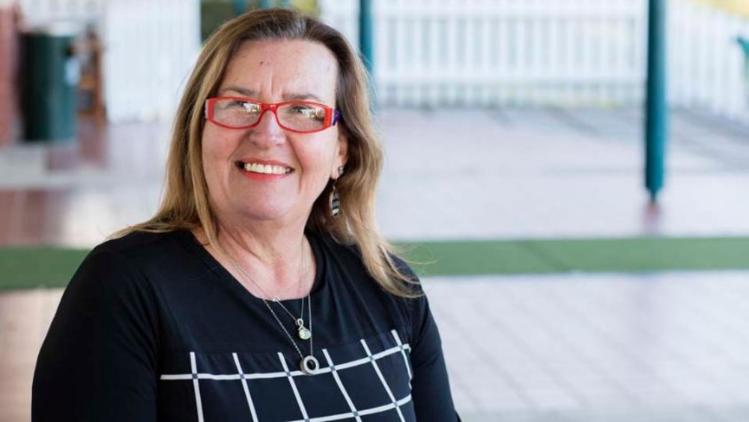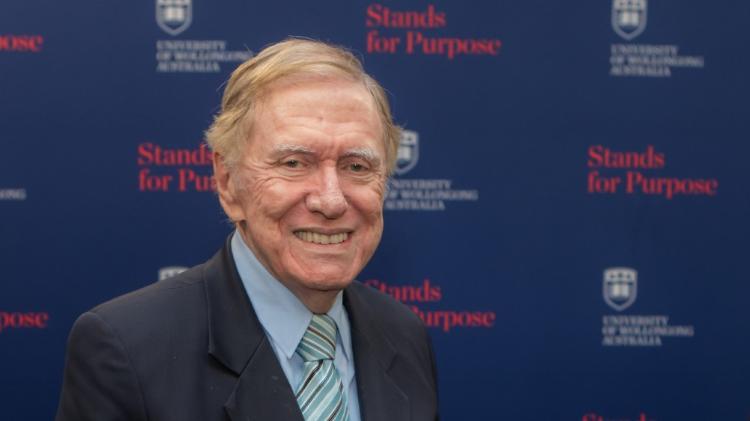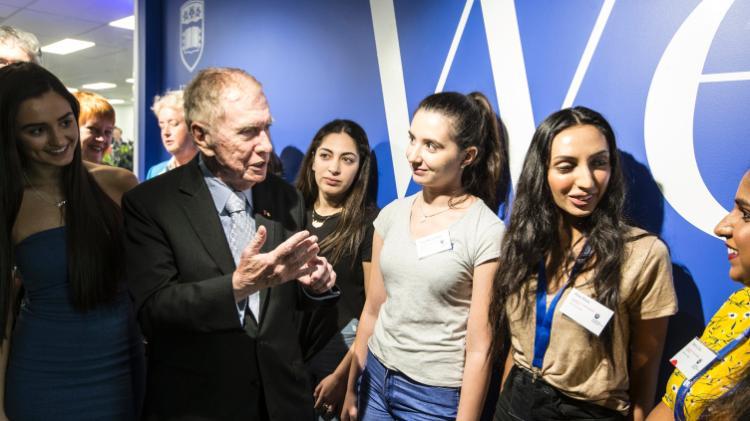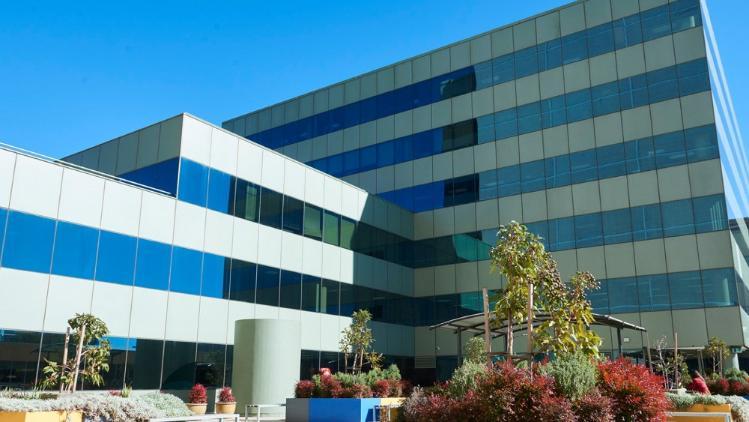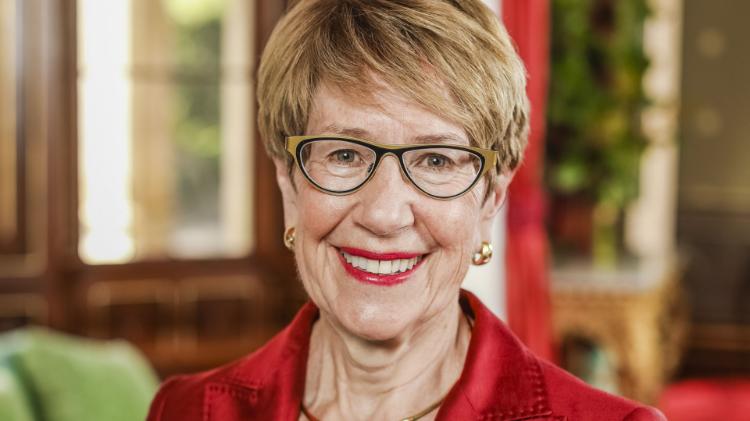The School of Law at the University of Wollongong is celebrating its 30th Anniversary year in 2021. UOW Law has long been committed to teaching excellence and providing a legal education grounded in social justice values and which engages with the complexities of law's intersection with society. Our legal research has been formally ranked above world class and is rich in expertise, interdisciplinarity and international perspectives. Let us share with you what events and initiatives we have planned to mark our 30th Anniversary Year.
Celebrating 30 years of Law at UOW
Professor Sally Kift | President, Australian Learning & Teaching Fellows
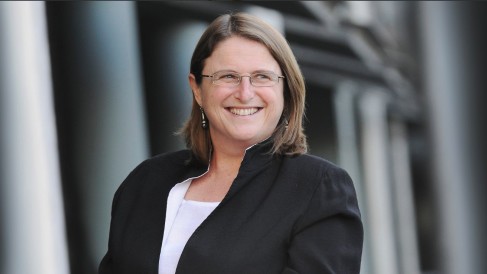
Professor Sally Kift PFHEA FAAL ALTF GAICD. Professor Sally Kift is a Principal Fellow of the Higher Education Academy (PFHEA), a Fellow of the Australian Academy of Law (FAAL), and President of the Australian Learning & Teaching Fellows (ALTF). She has held several university leadership positions, including as Deputy Vice-Chancellor (Academic) at James Cook University. Sally is a national Teaching Award winner, a national Program Award winner and a national Senior Teaching Fellow on the First Year Experience.
In 2010, she was appointed an Australian Discipline Scholar in Law. In 2017, Sally received an Australian University Career Achievement Award for her contribution to Australian higher education. Sally was a member of the Australian Qualifications Framework Review Panel that reported to Government in September 2019.
'30 for 30' profiles
In celebration of our 30th anniversary year, over the course of 2021, we will be sharing with you 30 of our amazing Alumni, Students and Academic staff.
- Dr Kylie Lingard
- Quy Thanh Nguyen - student
- Dr Gabriel Garcia
- Stephanie Kent - Student
- Stacey Dowson - Alumni
- Andrew Mastroianni - student
- Carolyn Devries - Alumni
- Dr Niamh Kinchin
- Jacob May - student
- Doris Matlok - alumni
- Dr Andy Schmulow
- Tahlia Rodrigues - student
- Aaron Strickland - Alumni
- Theodore Totsis - student
- Bethany McGhie - alumni
- Dr Luis Gomez Romero
- Grace Welsby - student
- Dr Virginia Marshall - alumni
- Dr Lowell Bautista
- Associate Professor Cassandra Sharp
- Jackson Cocks - student
- Dr Sarah Wright
- Lachlan Auld - alumni
- Ruby Evans - student
- Associate Professor Sheikh Solaiman
- Emerson Hynard - student
- Courtney Bowie - alumni
- Mahmoud Joumaa - student
- Associate Professor Markus Wagner
- Dr Julia Quilter
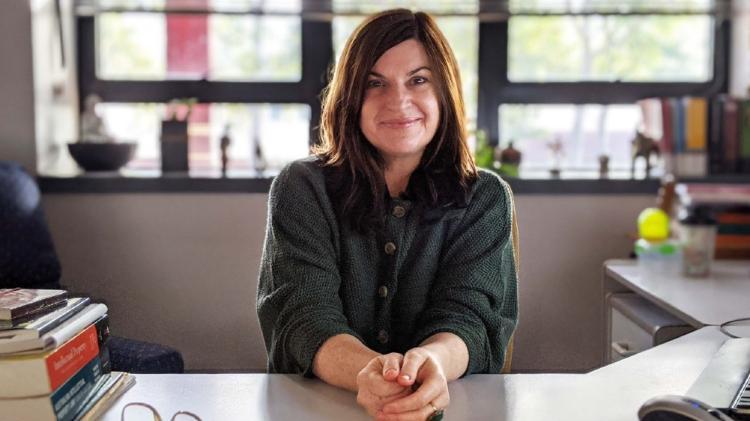
What were you doing prior to your academic career?
I started working when I was 14, weeding rose gardens (tip – wear gloves!). I had many different jobs after that. In my early 30s, I was a single parent working in a public library and I still didn’t know what I wanted to be when I grew up.
I took four weeks off work to figure it out. I narrowed it down to two possibilities – an artist living a hermit life in the country, or a lawyer. I’d like to say I choose the law solely out of a desire to be of service. While that was a big part of it, my artistic skills just weren’t good enough to earn any money.
So, in my early 30s, I started studying law. I didn’t even know what an academic was before then. Towards the end of my law degree, a mentor suggested I do an Honours year, so I did. I worked with a Wonnarua Elder to evaluate the duty to consult Aboriginal people before destroying cultural heritage in NSW. This work led to an offer to do a PhD through the CRC for Remote Economic Participation in Alice Springs. My PhD looked at strategies to support the interests of Aboriginal and Torres Strait Islander people in the commercialisation of bush food. I worked with Elders from Central Australia and the Kimberly, and bush food business owners, to try to identify feasible support strategies.
What led you to your career as an academic?
My Honours and PhD experiences taught me the value of accepting what I do not know. Accepting what I did not know attracted mentors. Those mentors led to my career as an academic. For example, a mentor advised me to do a PhD by publication. That advice positioned me as competitive for a postdoctoral position after my PhD. That position led to me living the dream as an academic in the Gong.
What do you think are your most significant research accomplishments?
My most significant research accomplishment is working with people to develop legal or non-legal strategies to suit their interests. This approach avoids assuming people’s interests. It also honours my definition of ‘success’, being the strength of the relationships I build along the way.
Are you currently working on any research papers?
After almost ten years looking at strategies to support the diverse interests of Aboriginal and Torres Strait Islander people in cultural heritage, traditional knowledge and native plants, I once again took time out to think about my next steps. That is when I decided I wanted to solve an unsolved crime, and write a book about one. When I shared that idea with a mentor, they suggested another idea - exploring what an Innocence Project might look like in New South Wales (another term I had never heard of!). After a few nights down the Google rabbit hole, I was hooked. I am now working on a paper that examines the effectiveness of conviction review mechanisms in NSW.
Do you currently receive any funding and, if so, why do you think they were interested in funding your project?
I recently received a grant to work with members of the legal profession to establish a new elective at UOW (‘Miscarriages of Justice’). One might think that a ‘miscarriages of justice’ project attracts funding because of the popularity of the topic on TV, but this funding application focused on the link between a ‘miscarriage of justice’ and access to justice. Such a project sits well within the social justice theme of UOW law school.
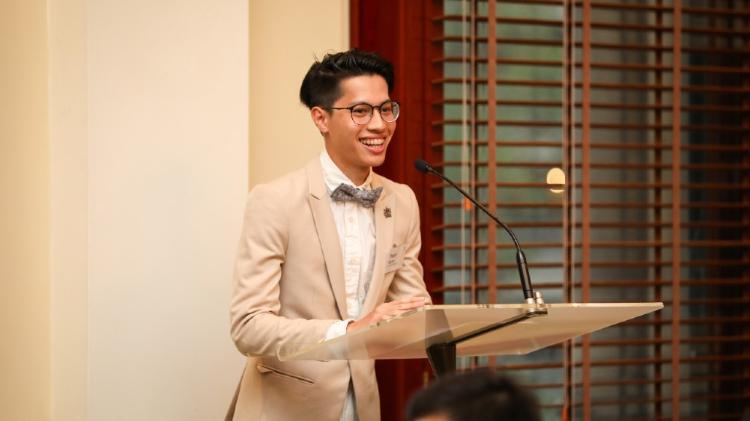
Bachelor of Laws - Bachelor of International Studies
Why did you choose to study your degree?
Growing up, I was always curious about the world and different cultures. Career wise, I wanted to study a degree that can equip me with the skills and knowledge to become a competitive candidate in the job market. As such, studying international relations and law is the best of both worlds for me, allowing me to both fulfil my passion and meet the practical need of securing a competitive job.
What have you enjoyed most about it so far?
For me, the best part about studying international relations is the opportunity to learn a foreign language as a minor. I learned Chinese Mandarin as part of my degree, went on exchange to Beijing, China for two weeks and even competed in an international Chinese language proficiency contest. My law degree to me, on the other hand, has been a test of resilience since day one. Studying along very hardworking and motivated peers, I constantly feel challenged. I have pushed myself very hard in the past years and managed to explore my hidden potential as a result.
What area of study is important to you and why?
There are three subjects that play a significant role in shaping my career direction: Chinese Mandarin, Contract Law and Law of Business Organisations (LOBO). I won first place for four Chinese Mandarin subjects and LOBO. These achievements allowed me to impress recruiters at job interviews and secure some highly competitive positions. I enjoy Contract Law because it is the subject that ignites my interest in commercial law and makes me want to pursue a career in this area of law. I studied Contract Law with Dr Yvonne Apolo. She is an enthusiastic teacher who was always there to offer me help and guidance. I enjoyed the content of Contract Law a lot, and much of it was because of Dr Apolo’s inspirational teaching.
At the end of your degree, what do you hope to achieve? (career, why, impact)
I recently received an offer to join the summer clerkship program with Baker McKenzie, a world-renowned international law firm. My imminent goal is to secure a graduate position following my completion of the clerkship. Working with an international law firm and working on matters that span the globe allow me to combine my interest in law and international relations, so none of what I studied in my double degree goes wasted.
What do you like most about the UOW campus?
I love how nature-immersed the UOW Wollongong campus is. This is so unique and I am sure not every student is lucky to study on a campus that is so green but at the same time very modern and equipped with state-of-the-art facilities like ours. One more thing I love about our campus is its vicinity to the beach. Nothing is better than heading straight to the beautiful Wollongong beach with my friends after some long hours of classes.
Why did you choose to study here?
I chose to study at UOW because of its competitive ranking both nationally and internationally. At the time I applied to study in Australia as an international student from Vietnam, UOW had one of the most generous scholarship policies among all universities in Australia. I was very fortunate to receive a scholarship which discounted my tuition fee by 50%. The scholarship was a testament of my academic achievements in high school and at the same time a reliever of financial burden on my parents back home in Vietnam.
What do you like about Wollongong?
I love the tranquillity that Wollongong offers. I was able to concentrate on my studies and performed quite well academically as a result. And the people of Wollongong are so friendly and helpful. I remember being so surprised when random people I walked pass on the street would smile at me in my first days in Wollongong. Now that I no longer live in Wollongong, I really miss the city and its people.
Is it a good place to study?
Wollongong is a great place to study. It more than what I think I would need, a world-class campus, modern facilities just like every other big city, lovely residents, and beautiful nature.
Is it easy to get around?
The free bus system that runs around Wollongong is truly one-of-a-kind. Commute around Wollongong is so easy to navigate thanks to the free bus. Many of my friends back home could not believe it when I told them we had free buses seven days a week.
How did you go about making friends at UOW?
I actively participated in volunteering activities on campus and made a lot of friends along the way. Also, in our first year of law school the pod system designed by the School of Law which requires us to study in the same class with the same classmates for the entire year really helped me build a support network and form lifelong friendships. I still stay in touch with many of my classmates from first-year law until now.
Have you done any co-curricular activities (UOWx, paid, volunteer etc)
I was extensively involved in co-curricular activities both on and off-campus since my first semester of study, from fundraising to being an international student ambassador and working as a student service officer. I also completed an 18-month leadership development program with City of Sydney where I was appointed as an International Student Leader and Ambassador by Sydney Lord Mayor, Clover Moore to plan and execute a multitude of projects to help international students feel welcome and supported during their studies. I was the team leader leading two successful international student tours and two networking events.
Have any of these things benefited your study?
Co-curricular activities are definitely beneficial to my study. It is a great way for me to make new friends, help others and learn new skills. I often walk away from these activities feeling positive and a sense of self-satisfaction, which helps me de-stress and motivates me when I study.
Have you conducted your internship? If so, where and what are the benefits of LLB 397/3397 Legal Internship Program being a core subject?
I completed an internship with a law firm specialised in criminal law in Sydney as part of LLB3397. The subject only required me to complete 20 days of work but my employer at this firm asked me to join them as a casual legal clerk after I completed the subject and even offered me a pathway to join them later as a solicitor.
What did you learn from your time at your internship? What new skills or opportunities did you receive?
Joining this law firm as part of my internship was a steep learning curve for me as it was my first employment in a legal environment. Everything was new to me and things were definitely quite challenging at first. However, now that I have been working with the firm for almost two years, I have become more competent in essential legal skills such as drafting, legal research and client interview as well as interpersonal skills such as communication, teamwork and time management.
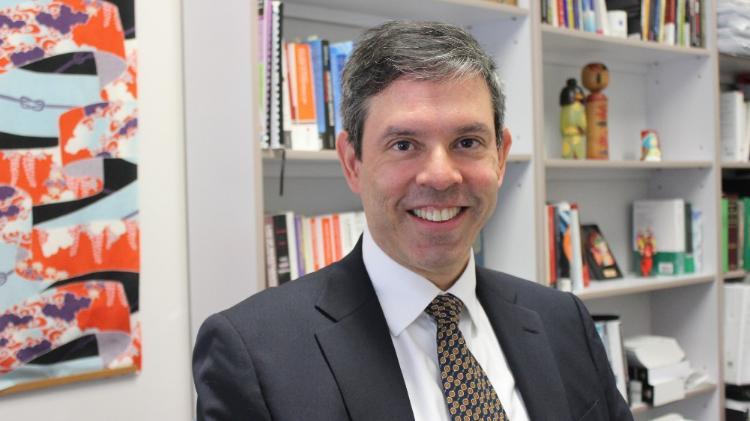
Senior Lecture, School of Law
What subject do you coordinate / teach at UOW?
I have been the subject coordinator of LLB 3302 Law of Business Organisations since 2016. I also teach LAW 101 Introduction to Law, LAW 960 Legal Studies for Professionals and LLB 3321 Banking Law.
How long have you worked for UOW?
I began working at UOW as a research assistant in 2004 and was appointed to a lecturer position in August 2011. I have held several roles at UOW including Deputy Head of the School of Law, Chair of the University Student Support Sub-Committee, Discipline Leader and Head of Students. My experience working at UOW has been very fulfilling and has helped me grow as an academic. I have a comprehensive understanding of tertiary education operations covering governance, research and teaching and learning.
What is the most rewarding part of your job?
Prior to moving to Australia, I worked for twelve years as a corporate and banking lawyer in Venezuela negotiating multibillion dollar deals and advising the Venezuelan government in financial and development matters. My legal career had not prepared me for academia, and I found the transition to be more challenging than expected. The part of my academic job that I find more rewarding as well as more challenging is the constant quest for knowledge and novel approaches to address problems. This pursuit manifests itself in multiple forms such as searching for pathways to improve institutions in Latin America, contributing to the debate about how governments in the region could take advantage of the renewal of Asia’s interest in strengthening relations with the Americas and creating new ways to engage with students, colleagues and the community.
What led you to your career as an academic?
While working in Venezuela, I had the opportunity to be involved in discussions about how the country would meet some of the conditions that were included in programs agreed with the World Bank and the International Monetary Fund in the 1990s. Although Venezuela met many of the required conditions, the country was unable to accomplish the main objectives of sustainable economic growth, reduction of poverty and a legal system based on the rule of law. Due to the lack of effectiveness of these programs to cure Venezuela’s malaise, I started questioning the role of these organisations.
Later in my career, I joined a team that helped to set up a development bank in Venezuela. I was required to complete placements in development banks in Mexico and Puerto Rico where I learned about their legal and financial operations. Upon my return to Venezuela, I led a team responsible for drafting a law that established the Venezuelan Development Bank and was later appointed as the General Counsel of the institution. I enjoyed working for the Venezuelan Development Bank for three years but the political situation deteriorated to such degree that my position became untenable. I resigned and enrolled in a research program at UOW to study the intersections between legal institutions and development. When I started working on my research proposal, I remembered what I had learned while studying at Boston University. My Asian colleagues talked about the economic and social successes of their countries. My informal conversations with my classmates helped me to select my research topic that focused on the International Monetary Fund, banking systems and the rule of law in Venezuela and Malaysia.
During my PhD candidacy at UOW, I received significant support from a great group of academics, including my supervisors, Deans, Head of Postgraduate Studies and colleagues. They made my transition from legal practice to academia run smoothly. Well before I completed my PhD, I was convinced my future path led to working as an academic and continued my research about law and development.
Are you currently working on any research papers?
I am currently working on three projects that will lead to publications. The first is a journal article that explores to what extent International Economic Law (IEL) has contributed to the expansion of China’s economic relations with Latin American and the Caribbean in the last twenty years. It argues that China uses an eclectic platform to engage with the region that combines hard-law instruments (e.g. free trade agreements) as well as other soft-law mechanisms such partnerships, the Belt and Road Initiative and the China-CELAC Forum.
The second project is a journal article that reviews the 2030 Agenda for Sustainable Development and examines whether Latin America and the Caribbean can achieve the SDGs by 2030. Prior to the onset of the COVID-19 pandemic, the region was falling behind the Agenda’s goals and targets for a variety of reasons, including economic slowdown and political instability. COVID-19 has worsened the outlook of Latin America and the Caribbean. The Americas is the region that has been worst affected by the pandemic in terms of number of COVID-19 cases and deaths.
The third project is a study of the strategies employed by Japan to nurture its economic relations with Latin America and the Caribbean. The Japanese government has been very interested in strengthening its relations with the Americas and is looking at how they may integrate the region into its Indo-Pacific strategy. In the next two years, I plan to continue working on this project in collaboration with colleagues from the Institute of Developing Economies of the Japan External Trade Organization (IDE-JETRO).
What do you think are your most significant research accomplishments?
The Visiting Research Fellowship awarded by IDE-JETRO in 2018 was one of the most significant achievements in my career and has been key to support my current research. The fellowship supported a four-month visit to IDE in Chiba, Japan to conduct research. The results of my work were published as a Discussion Paper (A Review of China’s and Japan’s International Engagement in South America: the Cases of Brazil, Chile and Venezuela). The paper was well received by the industry and research audience in Japan and Latin America. The support received from IDE also facilitated the preparation of an article that was published by the Iberoamerican Journal of Development Studies, one of the highest-ranked journals in Spain in the areas of Law and Development Studies (as per SJR and Scopus). This journal is open access and the article is written in Spanish, facilitating its use by a Latin American audience with limited access to journals due to economic and language barriers. The article focuses on Latin American and the Asian Century: A Comparative Analysis of Japan’s and China’s Engagement with their Latin-American Partners from an International Economic Law Perspective.
Guiding four students to the successful completion of their PhD theses is also a remarkable accomplishment. I have championed diversity and supervised students from developing countries who were not native-English speakers as well as female students who may have limited opportunities to enrol in a research degree. As a PhD supervisor of a very diverse group, I have been enriched and my knowledge of legal systems, cultures and religions has broadened.
What do you consider to be your best paper/work and why? What did it change about the way people approach the field?
I am most proud of two published articles. The first is a conference paper on Understanding IMF Stand-by Arrangements from the Perspective of International and Domestic Law. This paper was presented at a conference organised by the Society of International Economic Law in 2012 and is still widely consulted and accessed by central banks and international organisations across the globe. The IMF has often claimed that its arrangements and programs to assist state members are not legally binding agreements. This position facilitated that governments in Latin America implemented programs in the 1990s without legislative approval. This article demonstrated that the IMF’s arrangements were legally binding agreements that should have been approved by legislative bodies.
The second article, the Rise of the Global South, the IMF and the Future of Law and Development was published in 2016 by the Third World Quarterly, one of the leading journals in the field of Development Studies (as per SJR and Scopus). This paper argued that the Global South would have more influence in the Law and Development literature in the next few years and developing countries would have access to more options for the provision of official development assistance and finance for development.
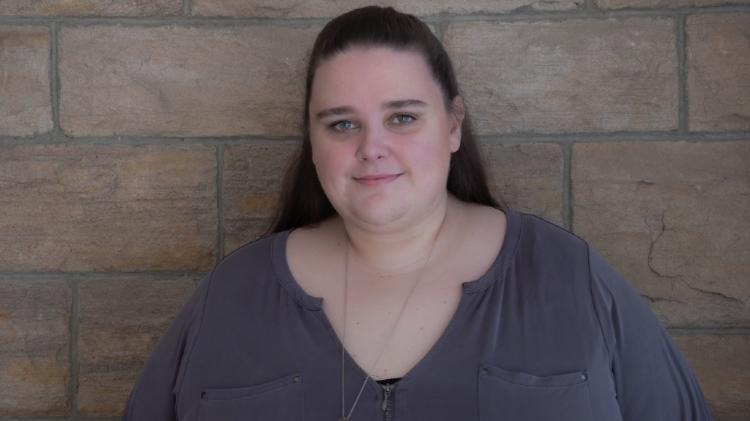
Stephanie Kent
Bachelor of Laws (Graduate Entry) – Sydney CBD campus
Why did you choose to study your degree?
I have had a long term interest in Law as it is a mix of problem solving and the potential to help people that really appeals to me. I’ve been considering this degree ever since I left high school and given that I have completed my Bachelor of Arts, jumping into a Graduate program like UOW’s felt like a great career move as most of the roles I’m interested in relate to the law in some way.
What have you enjoyed most about it so far?
I find the emphasis on critical thinking and being able to synthesise several topics into a coherent answer really appealing. It’s great to be pushed further than just rote learning the law and I think this is a skillset that I’ll use in whichever career I pursue in the future. I’ve also enjoyed my fellow students. I think that there’s a stereotype of law students being ruthlessly competitive and my experience has been the complete opposite. Being the first Sydney CBD cohort, we only have a small group and it’s very supportive. We laugh a lot, and people are always around with empathy when we have assessments or exams.
What area of study is important to you and why?
A social justice focus is essential for me. I love that the program keeps that focus on justice and particularly the focus on how the legal system has impacted First Nations people. I find that in seminars we can spend a good balance of time learning the letter of the law and nature of the legal system as it stands, as well as critiquing that system. I also really value being trained in skills. I don’t want to go into a workplace knowing a lot of theory without the ability to express that in an industry appropriate way. Of all the universities I was considering for my degree, UOW had the biggest skill focus.
At the end of your degree, what do you hope to achieve?
I need to get a better idea of what areas of law interest me the most, but right now I would say that I’d love to tipstaff for a year out of uni and then join the public sector or an NGO. The areas I particularly have my eye on are Legal Aid, Office of the Director of Public Prosecutions or the Department for Communities and Justice. Otherwise I love the idea of working in Community Legal Centres. Ultimately, I want to be going into an area where I feel like I'm helping others, whether that be on a one-to-one basis with a client or on broader terms working in policy. I feel like a law degree and practising as a solicitor, at least initially, will be the best way for me to make this impact.
What do you like most about the CBD campus?
The location is unable to be beat. Being a 5 minute light rail ride away from the best shopping in the city and having so many great hospitality options nearby is amazing. Plus seeing that view of the harbour is just a really great way to recharge between classes. The fact that the classrooms are equipped for dual delivery is also handy for making sure I can balance my personal and academic life.
Why did you choose to study here?
Out of the LLB options in Sydney, UOW aligned with me best in terms of social justice focus. But what really clinched the deal for me was a conversation I had with Head of Students before enrolling. My previous tertiary education taught me that engaged, passionate lecturers and support staff can make or break your experience studying so that greatly appealed to me. I didn’t realise before I applied that I’d be part of the first CBD cohort, and that’s been exciting. Being from Sydney I had never considered UOW among my options and when I started asking people their opinions of the university, I was really impressed with their answers.
Have you joined clubs/societies? (which clubs & why?)
Yes, I’ve joined the LSS to keep up to date with events and I’m hoping to compete in events in future years. I’ve found a lot of their wellbeing advice helpful as well as the resources they provided as a first year student. I’ve also joined SWORDS (Debating) which I’m somewhat pausing during distance learning though it’s been a great way to improve my confidence in speaking ‘off the cuff’ and in structuring arguments. I’m hoping to reengage next year and be involved in competitions.
What do you think of the student life at UOW / CBD?
Given the nature of the Sydney Business School, it’s a quieter campus and doesn’t always have many people on campus at one time, which is why I was surprised at how many events are going on and how friendly both students and staff have been on campus. They seem to have an event happening every couple of weeks, and it’s a mix between fun events like chocolate hunts and trips to cafes, and guest lectures. I also thought the lockdown survival packs were such a thoughtful idea, and I’ve been happy to see that the CBD events continue being organised virtually despite lockdown.
How did you go about making friends at UOW?
Having a class of only ten meant that making friends was easy! We started a group chat where we would celebrate, commiserate, share law memes, communicate any changes to class times as well as things going on in our personal lives. Discussing legal TV shows and movies has also been a favourite.
Have you utilised any support services? (academic/wellbeing)
I enrolled in Disability Support Services and I have been impressed. My advisor asked me questions about not only what support I need when it comes to assessments but also the learning environment and communicating my needs with teaching staff while still maintaining confidentiality. My advisor has been very responsive to any questions I have and I feel really confident that she and UOW have my back when it comes to any areas in which I need support.
Have you done any co-curricular activities (UOWx, paid, volunteer etc)
I took part in the first year pod mentoring program.
Have any of these things benefited your study?
Having fortnightly access to two students further along in their studies was beneficial. They gave advice on managing stress, what to expect in our subjects, exam technique, note taking and a glimpse of what future years would be like and their careers. It helped normalise the overwhelming feeling of starting at law school and I really appreciated them reminding us that they had felt similar when starting their program.
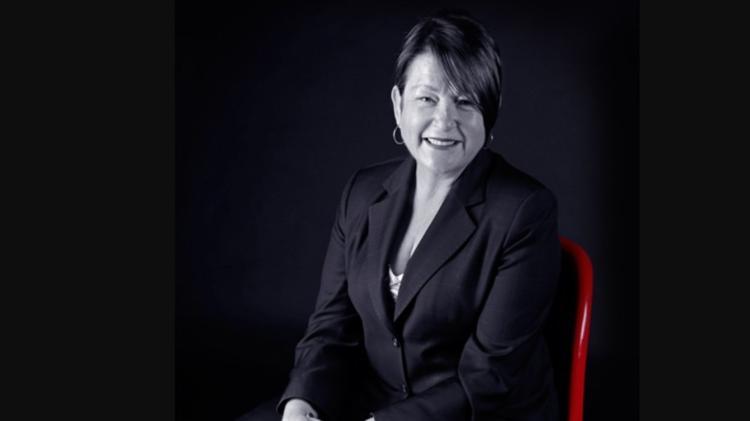
Bachelor of Laws
Managing Partner, Dowson Turco Lawyers (DTL)
Why did you choose to study your degree?
I began my studies at UOW in 1993, when I was 30 years old. I was one of the first years to be going through the law school. It was an exciting time. At the time I was tossing up between law and medicine and after a serious look at the alternatives I came to the realisation that I had always really wanted to do law.
Why did you chose to study at UOW?
I was tossing up between universities at the time. I looked at UNSW and USYD as well as UOW and Macquarie Uni. I was also not a traditional law student. Apart from being 30 when I started, my previous degree was one majoring in music and radio, so my background was already diverse and a little out there. In light of this unusual background and quite thankfully, I realised that UOW was the way to go for me.
What did you like most about UOW?
UOW did not disappoint. While some aspects were just as expected at a law school, there were many aspects that I really appreciated. I really appreciated the grown-up way the subjects were taught. I don’t think I ever attended a lecture at UOW. All subjects were taught through the Socratic Method which meant if you didn’t do the work, you simply could not participate in the discussion. It really was a self-driven degree and the general enthusiasm from teachers and classmates really drove me to do my best.
I also loved that the subject teachers and even the Dean of School, Jack Goldring, were not untouchable or unreachable. They really made an effort with all students to connect, teach and ultimately learn from each other. It was pretty amazing, the divide between student and teacher was almost non-existent. I made a number of friends in the teaching staff at my time there and I’ve kept up a number of them over the years.
Did you always know where you wanted your degree to take you?
Despite my unusual background for a law student, during my time at UOW, I was heartened and even encouraged to pursue law in my own way. One of our subjects required an 8 week placement and I was dreading this, as I could not see myself in a corporate world. The teachers encouraged me to take up the placement in the Community Legal Sector at Women’s Legal Resources Centre (WLRC) and I so did, I found the place to start my career.
I worked in many CLCs over the years, including WLRC, Wirringa Baiya Aboriginal Women’s Legal Centre, Marrickville Legal Centre, Redfern Legal Centre and a final stint at UTS Law Centre, before taking the plunge and heading out on my own in 2003.
What do you do for work now and what was the journey that got you there?
In 2008, I joined forces with Mary Turco to form Dowson Turco Lawyers, a law firm owned and operated as Australia’s only Out Loud and Proud® LGBTQI+ law firm and in 2012, DTL proudly welcomed Nicholas Stewart, our newest partner.
This was the start of my journey, my journey to law and doing it my own way. It is an ethos I stick to today. While I might have started out trying to fit in, I soon gave that up and decided to do law my way, progressive and diverse. I threw out many of the traditional notions that society had tried to make me fit into as a lawyer and I made the bold move of creating a law firm that suited me, suited the LGBTQI community and suited Newtown and its surrounding communities. At the time, I’d had numerous advisors telling me not to do it and that it wouldn’t work and it would end DTL, but I ignored the naysayers, preferring to pursue building Australia’s only Out Loud & Proud LGBTQI law firm.
I was admitted to the Supreme Court of New South Wales in 1996 and have since worked across many areas of law and through various positions in private and community practice and always with a distinct emphasis on diversity.
I have worked in numerous community legal centres focusing on women, First Nations Peoples, students and many other minority groups, notably within and for the LGBTQI+ communities.
I also assisted in contributing to LGBTI legal handbooks and have held the position of director at Women’s Legal Resources. I am also a proud member of one of the board appointed committees of the Sydney Gay and Lesbian Mardi Gras board and have been involved in that capacity for close to ten years.
What advice would you give to students who are aiming for a career path similar to yours?
If there is just one piece of advice I could give to students coming through UOW, it really is that you shouldn’t waste your time trying to fit in; be yourself and bring something new and different to the profession. Have trust in yourself and do it your own way. Diversity is strength and the profession needs all the strength and diversity it can get.
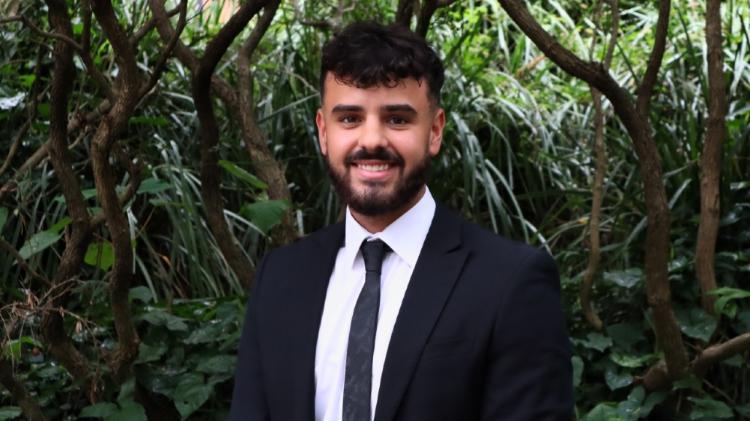
Bachelor of Laws (Honours) - Bachelor of Politics, Philosophy and Economics
Why did you choose to study your degree?
To tell the truth, when I started at UOW I wasn’t enrolled in my Bachelor of Laws degree! Initially, I had been offered to study Law through the Early Entry program, but I didn’t accept the offer as I wasn’t quite sure the degree was for me. However, after studying another degree for a year, I continued to hear of the amazing opportunities that studying Law at UOW offered. The diversity of career opportunities, the highly regarded academic staff and extracurricular activities really enticed me.
As a result, I enrolled into my Bachelor of Laws degree and haven’t looked back. I have always had a deep passion for human rights, public policy and advocating for social justice. It became clear that studying Law would enhance my knowledge of those interest areas, whilst providing me a world of opportunity with a School of Law that is truly committed to the pursuit of social justice.
What have you enjoyed most about it so far?
For me, it would definitely be the academic knowledge I have gained and the relationships I've developed, particularly with other students and the academic staff.
In terms of academic knowledge, studying law has allowed me to develop a style of thinking and writing that has been transferable to all aspects of my life. In fact, it would be the School of Law’s Mike Devitt whose advice of translating complex ideas into simple, yet concise, information that summarises it the best.
Beyond studies, the relationships I have developed with other students and academic staff are also beyond measure. Given the UOW School of Law is grounded in a commitment to social justice, when everyone around you is passionate in some way about this critical issue, you are elevated to be the best you can.
Together, these have enhanced my commitment to my studies all while providing me with a social network that has allowed me to develop and nurture relationships that I can see will be with me well after I graduate.
What area of study is important to you and why?
Undoubtedly, the pursuit of social justice, human rights and the threat of climate change are areas of study I feel most passion about.
Upon commencing my first semester of law, complex ideas relating to social justice were weaved into every subject, a true testament to the founding Dean - Jack Goldring’s vision. Studying electives such as Environmental Law, Human Rights Law and completing my Law Honours on the intersection of Climate Change and Human Rights Law are a further demonstration of the School’s commitment to shaping law graduates that recognise the importance of thinking critically about the law.
As part of my Law Honours research proposal, I was required to answer ‘why I have chosen the topic of climate change and human rights law’. I responded by stating that I envision a different and better future for our people and planet. A future where the dignity of every human and all of nature is respected and recognised in legal systems such as Australia’s. As a result, being committed to social justice is not simply a topic I am interested in, it is an aspect of our lives we must all be committed to in order to help create a fairer, more just and sustainable world.
What do you hope to achieve/do with your degree?
Excitingly, I have secured a Graduate position in KPMG Australia’s Human Rights and Social Impact team. I strived diligently over the past few years of my studies to work towards gaining the academic grades, extracurricular and professional experience to make this happen.
My goal has always been to pursue a career I was authentically passionate about. I want to wake up every morning excited to go to work to impart a meaningful impact on the world and know that now I am not only chasing but living the dream I have had from a young age.
What do you like most about the UOW campus?
Anyone who visits the UOW campus in Wollongong knows there aren’t many universities like it. Whether I am attending an 8:30am class or wrapping up a late-night study session, there is something about the natural environment (the duck ponds and its webbed feet residents especially!) at the Wollongong campus that helps provide balance even during more stressful periods.
In relation to the UOW School of Law, the open plan of Building 67 (having academic offices right near classrooms) was also fantastic. I loved being able to say hello to staff and have casual conversations, that open-door policy has made being on campus a very personable and comforting experience.
Why did you choose to study here?
I grew up in Wollongong, learnt to swim at UOW’s Aquatic Centre and had attended UOW for various events during my high school years. It was a no-brainer to pursue my tertiary studies at UOW, an institution that had already provided so much to me.
What do you like about Wollongong?
Growing up in Wollongong has provided the best of both worlds. You can be part of a connected community whilst living in a modern city with one of the world’s best universities.
My grandparents migrated to Wollongong many years ago and I am proud they decided on such a wonderful city to call home!
Is it a good place to study?
Absolutely! Being so close the water, having awesome restaurants and a vibrant nightlife makes Wollongong a great city to find a good balance between study and play.
Is it easy to get around?
Whether you drive, walk or ride a bike, Wollongong is becoming an extremely accessible city to get around. UOW’s campus is situated in the heart of Wollongong too which means you’re never too far from your favourite restaurant or bar.
Have you joined clubs/societies?
Yes – I have been on the executive of two awesome clubs at UOW.
The first is the University of Wollongong Law Students’ Society (UOWLSS). I joined the UOWLSS as a general member when I first started studying my Law degree and relished in the annual social events and extracurricular opportunities (such as being a First Year Mentor – would highly recommend!). Then, in 2020, I joined the UOWLSS committee as the Social Justice Officer, helping support the society’s equity and wellbeing initiatives. In 2021, I was voted in as the Vice President (Administration) where I have worked closely with the UOWLSS committee and executive to continue the amazing work the Society does.
In 2021, I also launched another club known as 180 Degrees Consulting (180DC). 180DC is a global initiative that is university-based and provides students of all degrees the opportunity to do volunteer consulting work with not-for-profits and social enterprises. Many UOW Law students have engaged with this club so far and as such, we have been able to showcase the amazing talent of these students to organisations not only in Wollongong but around the world!
What do you think of the student life at UOW?
Unreal! Whether you’re studying online or on campus, there are always events happening for you to get involved in.
How did you go about making friends at UOW?
Being myself and putting my hand up to join activities both inside and outside the classroom.
Have you conducted your internship? If so, where, and what are the benefits of the Legal Internship Program being a core subject?
I was fortunate enough to participate in the UOW School of Law – Malaysian Legal Internship in 2019. I was able to intern at one of Malaysia’s leading commercial law firms and shadowed one of Asia’s leading commercial litigators. I was also able to visit Australia’s High Commission in Malaysia and also had the pleasure of having dinner with the staff from UOW’s Malaysia campus! The experience was supported by the New Colombo Plan, which connects me to students all across Australia who have shared in similar experience!
I developed a wealth of knowledge from the internship, both in terms of my professional knowledge of the legal industry as well as exposure to Malaysia’s amazing culture.
What did you learn from your time at your internship? What new skills or opportunities did you receive?
I learnt that being a lawyer is more than just being knowledgeable about the law, a good researcher or advocate in court. The clientele and lawyers at the firm I interned with were from a variety of backgrounds and experiences. This meant being a strong communicator and a global citizen were integral to being an effective team member of the firm. I have carried this ethos in all the work I now do and hope my life after university allows me to continue to refine the skills learnt during my internship.
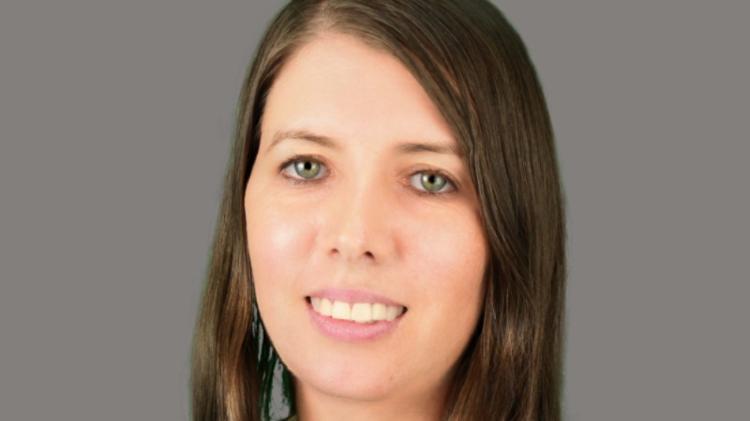
Bachelor of Commerce – Bachelor of Laws, GDLP
Founder and CEO of New Way Lawyers, Australia’s first non-profit law firm
Why did you choose to study your degree?
In my final years of high school, I had a couple of wonderful teachers who encouraged me to study law. They probably saw me as a natural fit because I had always been involved in debating, public speaking and mock trials as extra-curricular activities. Their words and encouragement had a big influence and I took on board their advice.
Why did you chose to study at UOW?
Initially I planned to study at the Australian National University in Canberra because it was closer to my hometown in country NSW. However, the son of a family friend was studying at the University of Wollongong and recommended it very highly. Based on that recommendation I instead decided to enrol at UOW
Was there an area of study that was important to you?
During my time of study, I was particularly interested in International Humanitarian Law, Criminal Law and Family Law. I was drawn to these areas of law because of the human factor and the inherent ability to help people.
What did you like most about the UOW campus?
The UOW Wollongong campus is positioned in such a beautiful natural setting, there were always lots of beautiful outdoor spaces to take in a nature break between classes. For sentimental reasons though, my favourite place on campus was always the uni bar, because it is where I met my now husband (we have been married for 20 years this year and have two children).
Did you join any clubs/societies? If so, which clubs & why?
In addition to studying full time, I also worked full time throughout my degree, so unfortunately there wasn’t much time for being part of clubs or societies.
What do you think of the student life at UOW?
UOW offers students a great balance of learning and leisure. The learning experience was second to none with access to modern facilities and resources and respected academic staff. From a leisure perspective there was always lots of activities and events on offer (I just wish I could have had more time available to enjoy these).
Did you conduct an internship during your degree? If so, where, and how did it benefit you?
I didn’t complete an internship however, I was able to secure employment as a law clerk at a law firm during the third year of my degree. I continued working at this firm until I graduated and it provided me with invaluable experience and the opportunity to apply what I was learning in practice.
What skills and experience did you receive during your degree that helped once you entered the world of work?
Completing my Graduate Diploma in Legal Training (PLT), after my law degree, was the highlight of my time at UOW. There was such a strong focus on teaching practical skills such as drafting, advocacy and research and these skills served me well once I was admitted as a lawyer and began practising.
What do you do for work now and what was the journey that got you there?
I am the founder and CEO of New Way Lawyers, Australia’s first non profit law firm. New Way Lawyers provides an alternative model of legal service provision, which responds to the gap in the legal services market by targeting services to individuals who are not eligible for government funded legal services but who cannot afford the cost of a private lawyer. Services are more accessible because there are no shareholders, partners or directors seeking a financial return – the purpose of fees charged is simply to cover costs not to generate profit. The non profit model also allows an inherent focus to be placed on client care. New Way Lawyers has a number of unique service offerings including ‘Lunch with a Lawyer’ which is a free online platform where individuals can ask family law questions from a lawyer and be provided with information and resources. New Way Lawyers has also established a Domestic Violence Fund to assist vulnerable individuals and a Client Care Program.
Before starting New Way Lawyers I spent time working for a couple of private law firms as a family and criminal lawyer. I loved the work because I was helping people but I felt constrained and frustrated by the system, which seemed to be so focused on billable hours and generating a financial return for investors. Feeling like a round peg in a square hole I actually walked away from my legal career for a while and worked in various roles in the non profit and community sector. I loved the non profit sector and it fit more with my core values of helping people so I enrolled to study my Masters in the Management of Non profit Organisations. While studying my Masters degree I began to conceptualise the non profit law firm model and in 2009 I started New Way Lawyers. It has been the most rewarding and challenging season of my career by far. Over the past 12 years New Way Lawyers has grown to a team of 18 employees and volunteers across five offices and now provides family law services Australia wide. I am excited to keep pioneering and growing this exciting model of legal service provision.
What opportunities did your degree open up for you?
My law and commerce degree equipped me with such a multi-disciplinary and diverse skill set. In my early career this allowed me to secure roles both nationally and internationally with both private and non profit organisations across many different industries. All of these skills and experiences then came together perfectly for my current role with New Way Lawyers.
Did you always know where you wanted your degree to take you?
When I first started studying my degree I actually didn’t have a particular end goal or plan in mind, apart from knowing that I wanted to help people and make a difference in my community. For a while, as a young lawyer in private practice, I actually felt like I may not be able to make a difference in the way that I had always hoped, however now through my work with New Way Lawyers I feel like every day I am helping and supporting individuals as they journey through their difficult family law situations.
What advice would you give to students who are aiming for a career path similar to yours?
The advice I would give to other students who have goals like mine is that all too often we expect ideas for innovation and change to come from positive inspiration and good experiences. We also sometimes have an expectation that the process innovation and change will be nicely packaged and straightforward and linear. However, the impetus for innovation and change can also come from frustration and experiences that leave you feeling negative and even jaded. Really tapping into the frustration and challenging negative experiences can be the most powerful catalyst for change.
Is there anything you would like to say on UOW School of Law’s 30th Anniversary?
Happy Birthday UOW School of Law!
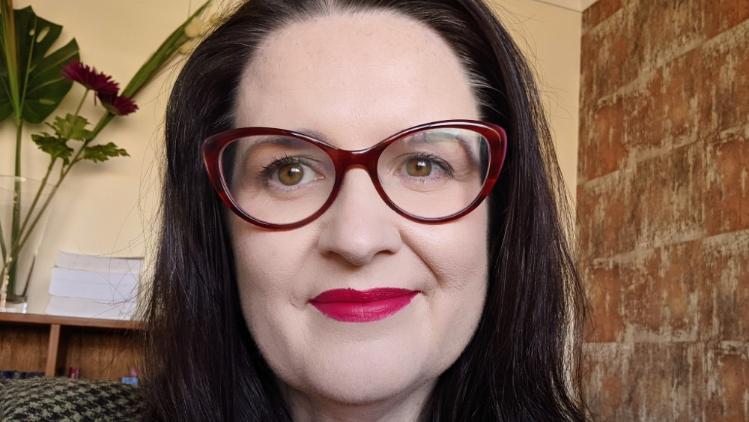
What led you to your career as an academic?
I was at a cross roads in my career and my government job wasn’t really going anywhere. I was trying to decide whether to pursue a career at the Bar or in academia. I really liked the idea of doing a PhD and I had met some academics who encouraged me in that direction. My children were just babies at that time as well, so I admit the flexibility of academia really appealed to me!
Are you currently working on any research papers?
Yes, I have four papers that I am currently working on. Two relate to the intersection of technology with refugee status determination (RSD). The first considers the potential and challenges of integrating artificial intelligence (AI) with RSD and the other paper argues that the challenges faced by AI in RSD credibility assessments only serves to expose its systemic flaws. I also have another paper which argues that extending the ‘implied powers’ of international organisations to ‘implied obligations’ might address the vexed question of the international community’s responsibility to protect. Finally, I have been invited to contribute a chapter to a handbook on international organisations by Edward Elgar publishing, which will focus on how IOs can keep themselves accountable via technology.
What do you think are your most significant research accomplishments?
Besides my PhD, which I started when my girls were still babies, I’d have to say my 2018 book, ‘Administrative Justice in the UN: Procedural Protections, Gaps and Proposals for Reform’ with Edward Elgar is my most significant research accomplishment. Besides getting to do some great field work in New York, Geneva, Bangkok and Kuala Lumpur, I somehow managed to get it finished in just over two years. Looking back, I don’t know how I managed to do that! But I am proud of it.
What do you consider to be your best paper/work and why? What did it change about the way people approach the field?
I’d like to think that my best work is in front of me. Oddly, my most cited paper is one that I submitted as part of my Masters degree. But my best so far would either be my book, which developed a theory on administrative justice, or a paper I wrote a few years ago about the implied human rights obligations of United Nations High Commissioner for Refugees.
Do you currently receive any funding and, if so, why do you think they were interested in funding your project?
I’m afraid not, but that is certainly an aspiration!
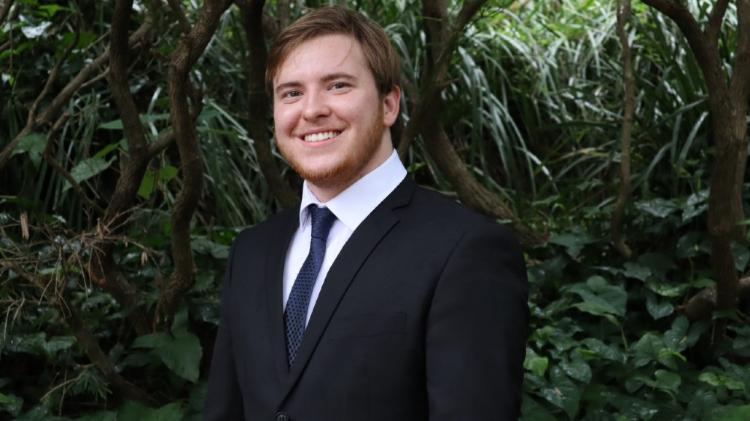
Jacob May
Bachelor of Arts (Japanese) - Bachelor of Laws
Why did you choose to study your degree?
I chose my degree because no matter what I did in high school, I kept on coming back to conversations about language and legal studies. It fascinated me how the law could affect so many different people in different ways, and the same goes for the language in which the law is written.
What have you enjoyed most about it so far?
What I have enjoyed most is definitely the challenge, and the sense of discovery that comes with it. The broad range of core subjects we undertake has made me realise interests I didn’t know I had!
What area of study is important to you and why?
To me, the most important areas of law are those which we interact with in our everyday lives; contract law, consumer protection, intellectual property and privacy. Language ties into this as well, as we are often unaware of the thousands of linguistic choices we make every time we interact with others.
What do you hope to achieve/do with your degree?
For many, the law seems like an invisible monolith that is difficult to navigate. I want to break down and analyse the use of language in the law, to show people how to use the law to protect themselves in their daily lives. I still have not decided whether I want to do this in a research context, a practice context, or both!
What do you like most about the UOW campus?
Definitely the integration with nature. UOW Wollongong Campus feels like a second home, and there is no shortage of spaces to sit, relax, study, and socialise. Second to that? Hemingway Café.
Why did you choose to study here?
I made my decision to study at UOW while I was visiting the uni for an HSC study day. We sat in on a lecture by Dr Julia Quilter where she spoke strongly and passionately about One Punch Law. She spoke with excitement and passion, and that really resonated with me. I decided I wanted to study at a uni where the academics and tutors loved their work, and could inspire me in mine.
What do you like about Wollongong? Do you find it easy to get around?
What I love about Wollongong is that it feels like home. I’ve lived most of my life by the water, and I love the balance between the calm, natural environment, but with all the facilities and convenience of a city.
Is it a good place to study?
Wollongong is a brilliant place to study. The uni has all of the resources you’ll ever need to complete your studies, and the town has a healthy balance of nature, social, and shopping activities, to help students create a healthy and enjoyable work, study, and life balance.
Is it easy to get around?
The public transport systems, including paid buses, free buses, and trains, the availability of Uber, and the location on the highway, makes it extremely easy to travel up to Sydney, down to Kiama, and anywhere in between.
Have you joined any clubs/societies?
I have! I am currently the UOW Law Students’ Society’s Vice President for Education. As a law student, I found it important to engage with the events and resources of the UOWLSS early, through being a mentee of the First Year Mentoring Program, and later becoming a mentor. From there, I was encouraged to apply for an executive role, and now here I am!
The UOWLSS is such an important body for all law students. We run competitions, workshops, networking evenings, parties, and everything in between to help law students at every stage of their journey, and I believe that is a very special opportunity to be a part of.
What do you think of the student life at UOW?
I couldn’t imagine studying anywhere else. The campus and its staff are all warm and inviting, and there is great camaraderie amongst students of all backgrounds and walks of life. If you want to feel accepted and empowered in your studies, UOW is the place to be.
How did you go about making friends at UOW?
Despite the size of Wollongong, the Wollongong campus has a regional feel. Everyone is extremely friendly and laid back, so just strike up a conversation with your classmates, a stranger in line at the café, join a club, or get in contact with your friendly Law Students’ Society!
Have you utilised any support services?
I have utilised many of the support services at UOW. Campus Clinic and Counselling have assisted me at very tumultuous periods during my studies. Peer Assisted Study Sessions (PASS) leaders, mentors, library services, and seminar leaders have always done everything in their power to make sure I have access to timely and accurate help with a range of academic services. It’s just one of the things that contribute to the friendly atmosphere of the university.
Have you done any co-curricular activities? Have these benefited your study?
I have involved myself in other small initiatives at the uni including setting up Goodwill Hunting – a kind of second-hand free-for-all, where new students can pick up free appliances, crockery, and other necessities. From memory, we spent over 10 hours moving goods and setting up tables.
Study is a journey, and as a university student, you not only learn about your study area, but you learn a lot about who you are and who you want to be. My interactions with clubs and societies, the skills I have learnt, and the friends I have made have been the cherry on top of my education. These past four years have been the fastest period of growth I have undergone, and I can confidently say I have become a better person, and a better student, for it.
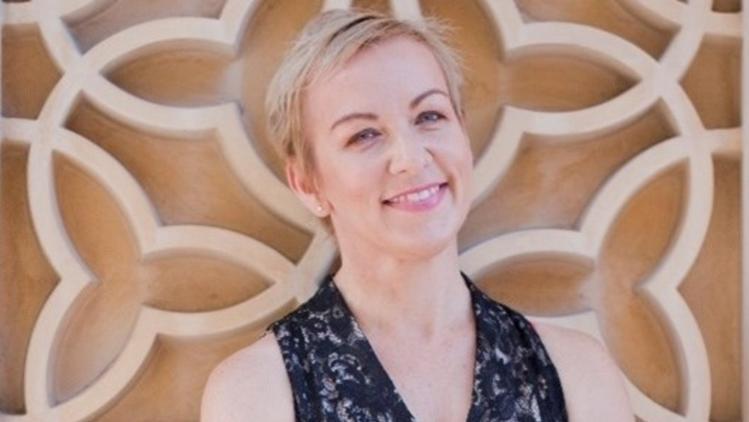
Principal Legal Officer at Department of Regional NSW
Degree: Bachelor of Laws
When did you study your law degree and why did you chose UOW?
I was one of the first students to enrol in the UOW law degree in 1991. I think there were only 20 of us in that first year, and there were only five of us in the first group of graduates in 1993! I chose UOW as I grew up and lived in the Illawarra and wanted to go to my local university, which was highly regarded. I also was impressed with Professor Jack Goldring’s approach to teaching and his vision for the law school.
As one of UOW Law’s earliest graduates, can you share something about your most significant memories of studying at UOW?
I loved the camaraderie among the students and enjoyed the small classroom settings. We were always challenged to think critically and exchange ideas.
What skills and experience did you gain during your degree that helped once you entered the world of work?
Jack Goldring’s philosophy of using the Socratic method of teaching has stayed with me throughout my professional life – to be practical, to think critically and to use reasoning and logic.
Can you share something about your career journey since studying your law degree at UOW?
After graduating, I worked as a lawyer at a major firm, was a legislative drafter for the Parliament of NSW, and I then lived and worked in the Middle East for 10 years as a lawyer at a multinational and as the head of knowledge and technology for a leading law firm in the Middle East. It was a dynamic and exciting environment and I worked on various high value and high profile projects. Being based in that part of the world meant I also got to travel extensively in the region as well as in Europe, Africa and Asia. It was such an enriching and rewarding experience.
What advice would you give to students now who are aiming for a career path similar to yours?
Career paths don’t have to be linear. Look at how you can apply your skills and knowledge outside of the traditional legal path.
Is there anything you would like to say on UOW School of Law’s 30th Anniversary?
I feel incredibly privileged that I was able to learn under the great Jack Goldring. He was a visionary and I am sure he would be proud of how the UOW Law School has grown and evolved since its small beginnings.
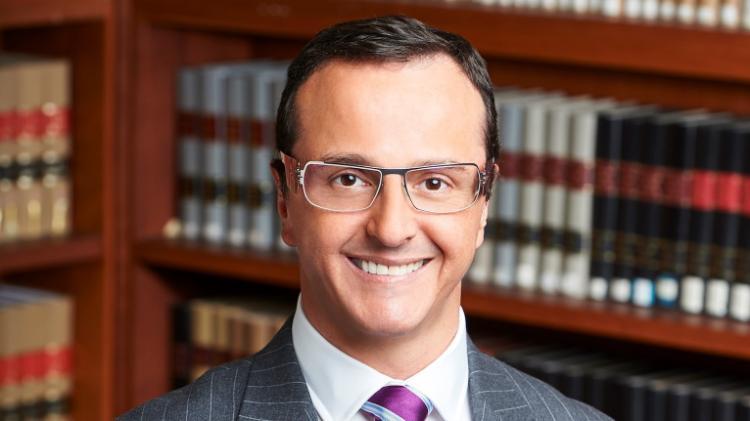
Dr Andy Schmulow
What led you to your career as an academic?
It’s the best job in the world. I get paid to research topics that I find fascinating, and where I think I can make a meaningful contribution to our collective understanding. I’m surrounded by incredibly smart and gifted colleagues, and I get to engage with equally smart, gifted young minds, eager to challenge and be challenged.
Are you currently working on any research papers?
Yes, five. These projects are bringing me into close contact with colleagues all over the world, and from a range of disciplines. We are harnessing our collective wisdom to tackle the causes of financial instability and financial crises, consumer harm and industry malpractice, and provide input into significant and current legislative reforms in four countries.
What do you think are your most significant research accomplishments?
The occasions where my research has been called for by governments and government inquiries (like the Banking Royal Commission), and then subsequently reflected in legislation that will fundamentally alter the rules by which the financial sector engages with, and treats, consumers. I am especially fortunate to have been invited by the World Bank last year to provide the thought-leadership for the creation of the world’s first customer-outcomes indicator framework, currently undergoing testing in South Africa. When deployed, the framework will materially improve the financial well-being of 55 million consumers. Thereafter the World Bank plans to roll the framework out to Brazil, Peru, Canada, The Philippines, and India, where it will improve the financial outcomes for 1.5 billion consumers.
What do you consider to be your best paper/work and why? What did it change about the way people approach the field?
A working paper written at the outset of my journey into Twin Peaks and not long after the conclusion of my PhD. It analyses the theoretical underpinnings of the Twin Peaks regime and has been downloaded and read thousands of times.
Do you currently receive any funding and, if so, why do you think they were interested in funding your project?
I earn consulting fees from banks, insurers and other financial service providers in South Africa. I believe they recognise that treating customers fairly is the most reliable path to building a sustainable business. And this is an outcome to which I am committed heart, mind, body and soul. I was also able to attract a substantial amount of funding from the World Bank, for the creation of a customer-outcomes indicator framework for measuring good consumer outcomes for the South African financial industry.
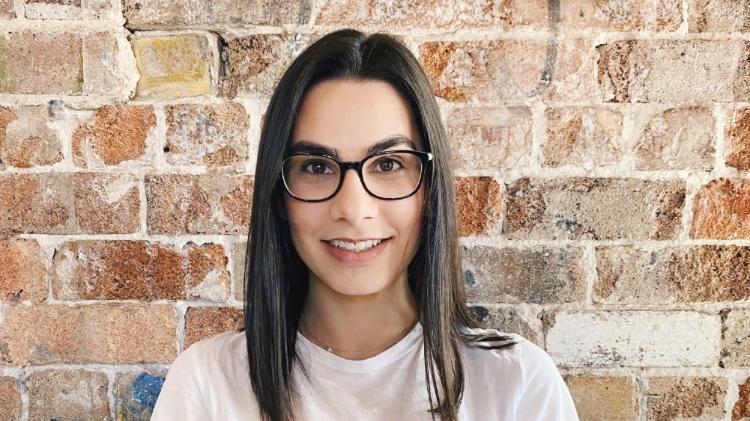
Bachelor of Laws and Bachelor of Commerce (Finance)
Why did you choose to study your degree?
I’ve been fortunate to know that I have wanted to pursue a career in law since I was roughly fourteen, and have always been drawn to its challenging, complex, and stimulating nature. The law is a powerful tool that can shape great change and touches almost every aspect of our daily lives. I’ve long wanted to be at the forefront of such change and partake in legal innovation and the defining issues of our time. The legal industry never stagnates, and I find comfort in knowing my work will be diverse and take on different forms as the world around me changes too.
What have you enjoyed most about it so far?
I have enjoyed being consistently challenged throughout my degree and being encouraged by academic staff to never stop learning or questioning the framework of our legal system. Although my personal interests are skewed towards corporate law, I have appreciated undertaking such a well-rounded degree that has afforded me the opportunity to study a diverse range of subjects.
What area of study is important to you and why?
Environmental Law (LLB334) is an area of study that particularly resonates with me. Climate change is arguably the most existential threat our generation faces, and I valued Environmental Law for its pertinence and ability to inspire positive change. Led by Dr Sarah Wright, the subject was filled with passionate class discussions about critically relevant issues, and I appreciated the extent to which it exposed me to new areas of law such as climate change litigation.
At the end of your degree, What do you hope to achieve?
At the beginning of my degree, my goals were steadfast – I saw myself practicing as a lawyer with a focus on litigation. However, having now reached the end of my degree, I am infinitely more open minded regarding my career path and am enticed by the fact my future plans are a blank slate. I now place a greater emphasis on the transferable skills my degree has given me – meticulous attention to detail, the ability to think critically when problem solving, and – perhaps most importantly – the courage to continually question my surroundings. I start my graduate role at Allens in their commercial litigation team in March and I am looking forward to seeing where my degree takes me and the doors that it will open in the future.
What do you like most about the UOW campus?
I lived close to the University of Wollongong during my degree and spent a lot of time on campus, both studying and socialising with friends. I loved the natural environment of the university – there’s an abundance of green spaces, duck ponds and the Wollongong Botanical Gardens is incredibly close by. In full transparency, I’d be lying if I didn’t admit to the ducks being my favourite part of campus.
Why did you choose to study here?
I chose the University of Wollongong for the law school’s approach to student learning, the high quality and personalised experience it promised, its insightful and affable academic staff, natural campus, and the convenience of being close to home. I found that the staff in the law school were always generous with their time, advice, and were forthcoming with a myriad of opportunities and experiences.
What do you think of the student life at UOW?
Student life at UOW is relaxed, peaceful and highly welcoming. There are a vast variety of places to eat on campus and the abundance of natural, green spaces gives the campus a calm and grounded feel. Student life is flexible and can be whatever you choose to make it – whether you want to dedicate yourself to study, volunteering, extra-curricular clubs or find a balance between all aspects of student life, you’re given the opportunity to shape your own university experience. I missed being on campus full time in my final year, so I would encourage all current students to make the most of any time they do get to enjoy on campus!
How did you go about making friends at UOW?
University is one of the best ways to meet new people and make friends given you’re thrown into a completely new environment with other people who share common interests and are similarly trying to find their way. More often than not, you’ll simply fall into a friendship. You’ll meet people in class, in lectures, lining up for coffee shops and on the walk into the exam room where the camaraderie is limitless. Push yourself out of your comfort zone, say yes to more, take every opportunity you can at university and you’ll simply find friends along the way.
Have you done any co-curricular activities?
I was incredibly fortunate to have been given the opportunity to attend the 2019 Songdo Model Conference of the Parties for the United Nations Framework Convention on Climate Change in Incheon, South Korea. I was sent by the University to represent Australia as a delegate and discuss how climate change is impacting our country and the measures we are taking as a nation to reduce our impact on the natural environment. This experience was critical in shaping my attitude towards a unified, global response to climate change, and came about simply because I expressed my interest in the subject to my environmental law lecturer.
During my time at UOW, I was also a PASS Leader for two years, facilitating first year accounting and finance subjects. Being a PASS Leader was by far the most rewarding job I’ve had. I have been lucky to be surrounded by intelligent, supportive, and diverse friends, family and colleagues who have helped me through university and shaped my career path – PASS was a way for me to pay this help forward. PASS allowed me to encourage all my students to push themselves, take full advantage of what UOW has to offer and recognise their potential.
Have any of these things benefited your study?
Both my time in South Korea and role as a PASS Leader have helped me further define the values that shape who I am. Importantly, these positions built on a wide variety of skills I used as a student and continue to use in my current job as a graduate lawyer. My problem-solving skills and capability to think critically were consistently challenged, I gained confidence in my ability to think on my feet and work to strict deadlines when under significant pressure, and refined my emotional intelligence in order to communicate with a variety of people from culturally diverse backgrounds. All of my co-curricular activities informed the decisions I made as a student, but more broadly, have been applicable in my day to day life and in my professional work. Co-curricular activities, whether they be sport, volunteering or joining a club will no doubt enrich your experience as a student at UOW; indeed, some of the most important things I’ve learnt have come from outside the classroom.
Tell us about your internship experience.
I completed my internship at Allens whilst I undertook my clerkship there during the 2019/2020 summer break. Legal experience can be difficult to obtain in the early years of a law degree, so having the internship as a core subject at UOW ensures all students benefit from practical experience. The wealth of knowledge practical experience provides cannot be found in textbooks and helps bridge the gap that purely classroom learning often leaves across all degrees. I’d advise all students to think about what area they want to partake in early on, that way you have ample time to organise an internship you’ll enjoy and gain the most out of. If you’re not sure, ask! I found insight from academic staff and work colleagues to be invaluable during this time and it helped me find my place in the legal system.
What did you learn from you time at your internship? What news skills or opportunities did you gain?
My internship/clerkship was a great chance to put my skills and learnings to use in a practical environment. I learnt how important teamwork is in a large corporate firm, the strength that comes from diversity and how complex the law can be for those outside its traditional ambit. I was able to volunteer at the Homeless Persons Legal Clinic in Sydney and saw first-hand the importance of the legal system being made accessible to the general public. In stark contrast, I was also lucky to work on large corporate matters and felt a real sense of accomplishment in knowing that my work was used by other members of the firm. Undertaking my internship/clerkship at Allens also afforded me the opportunity to continue working as a paralegal there during my final year of university and upon completion of my degree, a graduate role at the firm.
Despite all these experiences, I think the most important lesson I gained from my internship/clerkship is to back yourself. It can be incredibly overwhelming finishing university and starting a full time job in a new environment, though with resilience, enthusiasm and grit, you’ll land on your feet every time.
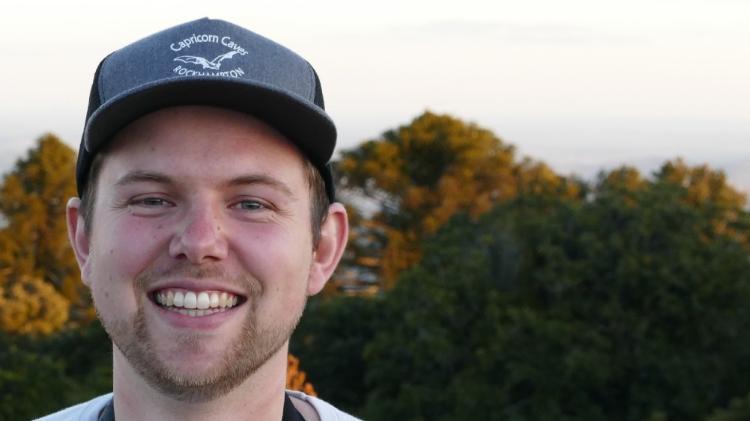
Bachelor of Laws (Honours Class 1)
Senior Legal Officer at the Department of Planning, Industry & Environment
What do you think of the student life at UOW?
I reckon the student life at UOW is great!
As a musician, I have fond memories of performing at the UniBar and watching some truly awesome gigs (WALLACE was my personal favourite). UOW students are so lucky to have a top-notch entertainment venue located in such a convenient spot (and with great chip rolls!)
I also remember hikes up Mount Keira between classes, picking native raspberries on the mountainside like some crazy forager. Honestly, there aren’t many universities where you can hike up a mountain (or even head to the beach) between tutorials. You have it pretty good in the Gong.
It’s also pretty special having the Botanical Gardens just across the road. I recall some beautiful afternoons at the garden catching up with friends, cramming in some study, or picking prickly pears like some crazy forager (hmm… seems to be a pattern emerging here).
But above all, the people at UOW are what makes the student life so good. There is such a great diversity of students and this creates a melting pot of ideas and cultures. The diversity also means that there is always a group out there who share your interests and it’s not too hard to find a club to get involved in. The university staff are fantastic and are genuinely committed to achieving the best for students. The legal practitioners around Wollongong and other School of Law alumni are also genuinely interested in seeing UOW students succeed. Occasionally a student will contact me out of the blue for advice or to discuss their studies and I am always happy to make the time to help them in any way that I can, because I am so grateful for the help that I received when I was a student!
Did you conduct an internship during your degree? If so, where and how did it benefit you?
Many! One of the great things about UOW is the emphasis on contribution to community and how this is instilled in students early on in their studies.
In my first year of my law degree, with the encouragement of one of my first-year tutors, I decided to approach the Aboriginal Legal Service in Nowra to shadow one of the solicitors there, Gary Pudney. It was a real eye-opening experience to observe the work of a solicitor representing disadvantaged clients at the Local Court.
In my second year, I was fortunate enough to spend three days with two Judges of the District Court as part of the District Court Judges Program run by the School of Law. It was absolutely fascinating and very cool to sneak a peek at the inner workings of a judge’s chambers. I believe that this program is still running and I highly recommend that students apply for this experience.
Having gained some of this practical experience, I then applied to volunteer as a legal assistant at the Illawarra Legal Centre (ILC). Again, this was advertised through the School of Law and I was very grateful for this opportunity. The people at the ILC were lovely and had a real passion for social justice. It was a supportive environment to build my legal skills, doing everything from interviewing clients to drafting barristers’ briefs and law reform submissions.
Following my time at the ILC, I completed a number of work experience placements, including with Graham Turnbull SC, Carter Ferguson Solicitors, the Office of the Director of Public Prosecutions, Salvos Legal Humanitarian, and Kernaghan & Associates.
These internships/placements were eye-opening and made me so much more employable at the end of my degree, so I would highly recommend that students consider putting up their hand for as many of these opportunities as possible!
What do you do for work now and what was the journey that got you there?
I am currently a Senior Legal Officer at the Department of Planning, Industry & Environment, advising government clients on multi-million (and sometimes multi-billion) dollar transactions including important developments to increase green space and increase the supply of social housing across NSW. I love the work and, most importantly, I love my team. My boss, Amanda Alassad-Bruun, is an absolute legend and has been so flexible in allowing me to do my work remotely from the Central West (Bathurst/Orange). Every day, I start work excited about the work that our team does, knowing that it is making a real difference to the lives of people in NSW.
But my journey to this role was full of twists and turns!
After graduating from UOW, I worked as a paralegal at a top-tier firm before heading out West to start my first role as a solicitor in Dubbo. Although the job didn’t quite work out, it was in Dubbo that I met my beautiful wife Jodie, so I am a strong believer that everything happens for a reason!
I was then very fortunate to work at a firm in Orange with a very kind and knowledgeable man, Clive Hill, and his lovely wife Jane. As a young lawyer starting out, the relationship between you and your supervisor is so important and it is crucial that you build a strong relationship and earn their trust. Once I started working with Clive, we quickly became good friends. I still catch up with Clive and Jane regularly for coffee or trips out to their farm, and made sure that they were top of the invite list when Jodie and I got married!
Under Clive’s mentorship, I practiced in criminal law, property law, family law, wills and estates, debt recovery and civil litigation, and appeared regularly in the Local Court, District Court, Children’s Court and Federal Circuit Court. I was also a member of two Legal Aid panels and worked as duty solicitor at various local courts. I loved getting a taste for different areas of the law, and I would highly recommend that law graduates consider generalist legal practice before specialising in a certain area. For me, I quickly identified that property and commercial law was my passion.
I then started a new role with a firm in Bathurst, working with and supervising a small property and commercial law team. Again, I was very fortunate to work some truly amazing people. With the support of my team, I honed my commercial law skills, with a particular focus on small businesses and startups. In 2019, I started advising entrepreneurs and startups as the legal mentor at the Upstairs Regional Incubator in Bathurst and, in the following year, I was honoured to be named as one of the top 10 commercial lawyers in Australia under the age of 30 in the Lawyers Weekly ‘30 Under 30 Awards’.
Did you always know where you wanted your degree to take you?
Not at all! I flipped and flopped between different ideas throughout my degree, and I think that’s the important thing to keep in mind: you don’t always need to have it all planned out in advance. If you bring enthusiasm to your studies and really engage with the content, you will get a clearer idea over time as to what you want to do with your degree. And if you put yourself out there, opportunities will present themselves to you.
What advice would you give to students who are aiming for a career path similar to yours?
1. Start your extra-curricular activities and networking early on – it is amazing how many opportunities can come from being in the right place at the right time. Put yourself out there and get involved in some relevant groups. If you are naturally introverted (like myself), you can still put yourself out there and get involved; you just need to decide what will work best for you and your comfort levels.
2. Don’t be afraid to make friends with your tutors and lecturers and ask them lots of questions! It’s not high school anymore – I promise that no one is going to call you a “teacher’s pet”! The academic staff at the School of Law are all incredible, friendly people with extremely impressive backgrounds and accomplishments. Each of them has a wealth of knowledge and it would be silly not to draw on that knowledge as much as you can! When I think about UOW, the first thing that I think of is the friendships with my tutors like Luis Gomez-Romero, John Littrich, Trish Mundy, Andrew Kelly - the list goes on!
3. Consider job opportunities in regional areas. Even if it seems that there are no legal roles available in a certain regional area, keep in mind that often these roles aren’t advertised. Try reaching out to the local firms or the local law society, just in case. I strongly believe that regional practice is such a great way for a young lawyer to start their career. Typically, you will be meeting with (and managing) clients earlier in your career and getting exposure to a wider range of legal matters. This can mean that you develop your legal skills and progress through your career at a much faster rate.
4. Don’t forget job opportunities within government! Government departments and agencies are always on the look-out for legal talent and, in my experience, are excellent places to work. Often, you can directly see the positive impact that your work is having, and this is very fulfilling! For example, there’s nothing that our team enjoys more than working in tandem with our clients to complete a social housing development and knowing that families will soon be moving into new, clean and safe homes in a revitalised community. I highly recommend that you keep a look out for law graduate roles within government or consider a government role after a few years cutting your teeth in private practice.
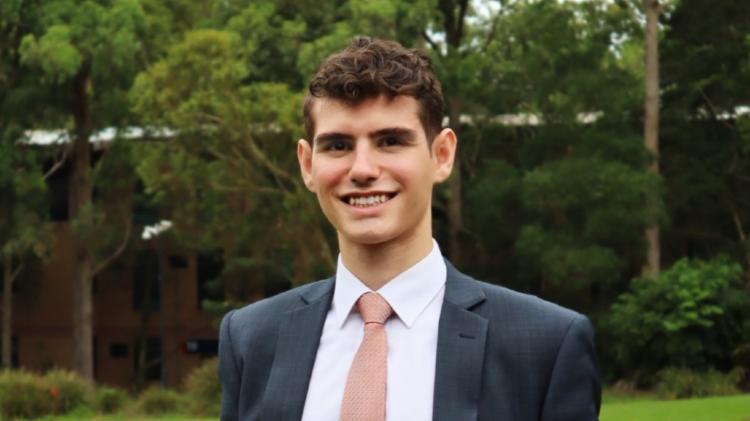
Bachelor of Laws - Bachelor of Politics, Philosophy and Economics
Why did you choose to study your degree?
I chose to study my degree because it was described as ‘the course to take’ for those seeking to create change in the world. The change that I wanted to create was, in all honesty, unknown to me at the time. Looking back, I at first thought it was about me proving to others what I could be capable of. But, with the years that followed, I soon discovered my true ‘why’, which was to prove to myself that I could be capable of something extraordinary – I just needed to have faith in my ability to apply myself.
What have you enjoyed most about it so far?
I could say something sappy about the people that I have met, and the opportunities I have received, but I’d rather sum that all up by saying that the journey from where I was and where I am now has been the most enjoyable factor. Receiving that chance to look back at the amazing things you have accomplished and the incredible people you have met is something that makes you feel fulfilled! I can confidently say that there is no better feeling than that, as it means you have been living a life that is true and meaningful to you.
What area of study is important to you and why?
I won’t lie, studying law was the last thing I thought that I would be doing! But law is so much more than just cases, court and the ‘black-letter’. When I started my studies, I was infatuated with Jurisprudence (legal philosophy) and now I am interested in the intersection of law and technology as well as contemporary thought on refining workflow frameworks within the legal industry. All-in-all, I have become a sucker for rethinking how we interact with the law.
At the end of your degree, what do you hope to achieve?
Ultimately, what I hope to achieve is what I’ve wanted since day one: a fairer world. That hope will never change, but my approach to achieving it might. One day I may no longer work within the legal industry, and I am fine with that so long as where I am is some place true to what I enjoy and I am capable of meaningfully effecting change from that place. Peers and even legal professionals have commented on me one day seeking to become the Prime Minister of Australia. While I laugh for humility, I later reflect and concur that positions of such nature are something I aim for. Maybe you will find me there, or with the UN, or leading some new tech start-up that will ‘change the world’. At the end of the day, the person defines the position and I hope my future professional impact stays defined by my hope for a fairer world.
What do you like most about the UOW campus?
I love the Wollongong campus’ locality to the beach as well as the ability to lose oneself within its ‘rainforest-alleys’. It’s important to switch off from work and technology from time to time, and the UOW Wollongong campus allows for just that! Whether it’s a peaceful walk along brick paths or being serenaded by a live performer while lounging against the grass, the Wollongong campus always leaves me relaxed and smiling.
Why did you choose to study here?
It was the only University, that I can recall, that offered my double degree with the benefit of coastal living!
What do you like about Wollongong?
I left Sydney and moved out of home at the age of 17 to start my life independently in Wollongong, and I made no mistake with that decision. The lifestyle is great and the ability for one to walk everywhere is fantastic!
Is it a good place to study?
Definitely! It’s important to remember that effective study is defined also by your mindset. Living and studying within Wollongong provides many opportunities for you to build upon a healthy lifestyle of sun and fun while also laying the foundations to your career. If you can perfect the balance between study and play, then you will have the time of your life and get the results to match it.
Is it easy to get around?
After living in Wollongong independently for four years now, the one thing I will miss by moving back to Sydney is the convenience of the free shuttle bus. Both the City of Wollongong and UOW supply buses to get you from A to B for free! What more could you ask for?
Have you joined clubs/societies? (which clubs & why?)
In 2017, I joined the UOW Law Students’ Society. I am now President of that Society and represent about 2,000 or more others just like me! Between then and now, I have also served as the Head of Merchandising for the UOW Economics and Finance Society, as well as the Vice President of the Philosophy Forum – and so much more! On a personal level, I enjoy the connectivity that comes with joining clubs and societies; while professionally, I enjoy the push to do more.
What do you think of the student life at UOW?
It’s great! I have met so many wonderful people at UOW that I now call my best friends and my support system.
How did you go about making friends at UOW?
I moved on campus for three years – the rest speaks for itself!
Have you done any co-curricular activities (UOWx, paid, volunteer etc)
I have undertaken many co-curricular activities in my time at UOW. The amount of volunteering that I have done is concerning when accounting for me working 3-5 days a week and studying full time. Since I started in 2017, I have been a Global Communicators Program participant; Vinnies Van volunteer; Student Leader; Head of Merchandising; Competitions Officer; Vice President (Internal Competitions); Vice President; President; First Year Law Mentor; Mock Juror; O-Day Stall assistant; Student Advisory Council undergraduate representative; Academic Senate undergraduate representative; and more. I can confidently say that for the past four years I have volunteered enough hours per week to constitute a full-time job with overtime.
These experiences have not only benefitted my studies, more importantly, they have benefited me professionally.
Have you conducted your internship? If so, where and what are the benefits of the Legal Internship Program being a core subject?
I have conducted two internships and one placement while a student at UOW. The first internship was per the LLB 397/3397 Legal Internship Program which occurred with a boutique law firm in Sutherland in the Summer of 2018/19. The second internship occurred more recently in the Summer of 2020/21 as a Paralegal with Medibank’s Legal, Governance and Regulatory Affairs team. My placement occurred during the Summer of 2020/21 and involved a two-week full-time associateship with Her Honour Judith C. Gibson DCJ.
11 days into my LLB 397/3397 based internship, I was offered a job as a Paralegal. Without the Program being a core subject, I may well have never even stepped foot within a law firm until after my admission as a lawyer. Thankfully, that opportunity taught me invaluable skills that I transferred into other roles and onto other students. More importantly, it gave me the confidence to seek out other opportunities such as those at the District Court and Medibank.
What did you learn from your time at your internship? What new skills or opportunities did you receive?
Enough to turn me from an untidy, unorganised law student to a productivity-obsessed, clean shaven and knowledgeable adult. Time management was probably the key learning point here, but also attitude. I have always been a team leader and taken initiative but that translates differently in law firms. I won’t go into the tricks of the trade that I learned as I don’t want this to become a novel; or, what my peers refer to as a ‘Theograph’. I’ll cut straight to it: internships enable opportunity. Do one, and you will likely find yourself in another not too long later; or, if you are lucky, a job.
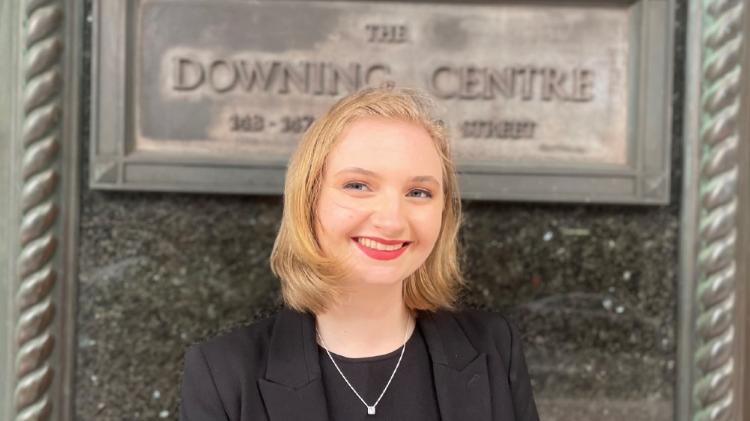
Associate at the District Court of NSW
Degree: Bachelor of Laws (Honours Class I), 2019
Why did you choose to study your degree?
I chose to study law primarily as I believed it would give me the skills and knowledge to make a meaningful impact in the community. I’ve always had an interest in politics and the legal system, and the role law plays within our society. I’ve also had a passion for public speaking and arguing. A degree and eventual career in law provided an avenue for these passions to collide.
Why did you chose to study at UOW?
Having spent my high school years in Wollongong, I wanted to continue my higher education in the area. I was intrigued by the unique structure of the law degree (with the POD system), as well as the focus on the practicalities of a law degree and the unique internship opportunities available. I think the requirement to have at least 20 days of experience in the legal profession prior to graduation was an amazing way to get my foot in the door with the profession, and to set my sights on life beyond university.
Was there an area of study that was important to you?
All of law! But also completing my honours year and writing my thesis. Having the opportunity to work closely with a prominent academic (Dr Victoria Colvin, to whom I am forever indebted), and create a completely original and unique piece of work that I’m still incredibly proud of, was definitely a highlight. The independence and satisfaction I felt from submitting my final piece of work was a truly special moment for me and not something I will forget as I continue my career.
What did you like most about the UOW campus?
UOW has such a beautiful and picturesque campus; I have many a fond memory sitting in between classes with my friends at the duck pond. The environment at UOW Wollongong campus is so inviting and familiar to me. Being a regional university, I felt my experience was more grounded compared to an experience I may have had at another university.
Did you join any clubs/societies? If so, which clubs & why?
I was a member of the UOW Law Students Society (UOWLSS) and was fortunate to be voted Vice President (Careers) in 2019, my final year of university. As part of the society, I wanted to increase the awareness for clerkships and other job opportunities for students within the Illawarra and Sydney region, and really showcase the talented and versatile students we produce at UOW. I had the opportunity to organise events, such as the annual Careers Fair and “Day at a Firm” (where students would spend a day at a top tier firm in Sydney), wrote the Clerkship guide and created the UOW Law Careers Facebook page, advertising job opportunities.
What do you think of the student life at UOW?
Student life was always a buzz at UOW; whether it was going to the latest gig at Unibar, the many hours I spent within the library or the wonderful food stalls I frequented regularly, there was never a dull day on campus. Being an active member of the UOWLSS also meant I got to participate and enjoy a number of club events, from the Harbour Cruise on Sydney Harbour to the annual coveted Law Ball at the end of the year.
Did you receive any scholarships? If so, which one?
I received the Vice-Chancellor’s Academic Excellence Award in 2015 and a Short Term Travel Grant in 2018.
How did it benefit you?
The 2015 award helped fund my textbooks and allowed me to pursue volunteer opportunities within my first year of university. The 2018 grant assisted me when I travelled to Japan as part of Team Australia in the Intercollegiate Negotiation Competition.
Did you conduct an internship during your degree? If so, where, and how did it benefit you?
I undertook several internships throughout my degree. In 2018 and 2019, I volunteered at the Illawarra Legal Centre on Thursday evenings, assisting volunteer solicitors in providing free advice to those in the community. In 2018, I participated in Public Interest Advocacy Centre’s Winter Law School. As part of the subject at university, I assisted the Illawarra Legal Centre and the Warrawong Community Centre in collecting empirical data for the ARC Linkage Project 'The Criminalisation of Poverty.’ My role was to interview persons who either were homeless, or had experienced homelessness in the last 12 months, and gather data concerning their interactions with the criminal justice system. In the Summer of 2018-2019, I clerked at Herbert Smith Freehills, where I assisted solicitors and partners within the Employment, Industrial Relations and Safety (EIRS) Team. Finally, I undertook my LLB339 internship with his Honour Magistrate Michael Barko at Sydney Downing Centre in 2019, where I got to shadow his Honour and receive his insights on the workings of the busiest Court in NSW. All these opportunities provided me with a vast array of experience of all the versatile opportunities available with a law degree, and helped cement my passion for a career in the law.
What skills and experience did you gain during your degree that helped once you entered the world of work?
Throughout my time at university, I was an active ‘mooter’. I participated in UOWLSS run competitions, such as the Junior and Senior Moots, as well as external competitions, such as the Gibbs Constitutional Law Moot, which I competed in twice in Melbourne, and the Australian Administrative Appeals Tribunal Mooting Competition, in which I competed alongside my mooting partner for 12 weeks, ultimately finishing in second place. A highlight of my mooting career came with my selection to represent UOW as part of Team Australia at the Intercollegiate Negotiation Competition in Japan. As part of the competition in 2018, I travelled to Japan alongside 21 other students from different universities in Australia in a two day negotiation and arbitration competition against the top law schools across the Asia-Pacific region. Team Australia was declared the overall winner of the competition and is one of my most proud accomplishments. The mooting opportunities I was presented with at UOW were fundamental in securing my desire for a career in advocacy, and for sharpening my skills in applying the law in a practical setting. Such experiences also led to me develop my networking skills alongside my peers and I now have a number of lifelong friends whom I hope to remain close with as I continue my career.
What do you do for work now and what was the journey that got you there?
Following my graduation in 2019, I was fortunate to work as the Associate for former Attorney General of NSW, the Honourable Judge John Hatzistergos AM at the District Court of NSW in 2020. I found out about the application process through my discussions with a fellow UOW graduate, and due to the reputation of UOW graduates within the District Court and the diverse opportunities I had undertaken throughout my degree, I was a good fit for the role. I am fortunate to currently work as the Associate to her Honour Judge Kara Shead SC at the District Court of NSW, which I secured following my experience with Judge Hatzistergos. Her Honour is one of two Judges in NSW who sits in the Child Sexual Offence Evidence Program (CSOEP), which case manages and oversees the pre-recorded evidence of child complainants and witnesses in child sexual assault matters.
What opportunities did your degree open up for you?
Being an Associate at the District Court of NSW, which is a truly unique experience. After a year and a half in the role, I have been exposed to diverse areas of law and the different practices and procedures employed at the Court. In my current role as an Associate in the CSOEP, I have an incredibly hands on role. I have steady communication with members of the legal profession and Victims Services, participate in discussions concerning the efficacy of the CSOEP, undertake complex legal research, and assist in the drafting of orders and judgments. Having such a hands on role in an area that I am incredibly passionate about, witnessing persuasive advocacy every day and having the opportunity to discuss what had just happened with such a prominent and accomplished member of my field is an unparalleled opportunity and will no doubt have a massive impact on me as I develop my career as an advocate.
Did you always know where you wanted your degree to take you?
I always knew I wanted to be an advocate before I even commenced my law degree. I often think back to the young, somewhat naïve 18 year old who strode into her first POD seminar (go POD 5!), wondering where her degree would take her. I don’t think I could’ve anticipated the wonderful amount of opportunities I would be presented with at UOW, but I know without seizing them, I would not be on the path I am now.
What advice would you give to students who are aiming for a career path similar to yours?
First, take up any opportunity that comes your way, and even if you don’t think you’ll get it, APPLY. Whether it’s a competition, an internship or a job in the legal profession, just becoming familiar with different application processes will provide you with useful insight into what is required of you later down the track. I’ve applied for a variety of different opportunities throughout my degree with varying degrees of success, but the process has always been invaluable. Second, try and surround yourself with a supportive network – whether it be your friends (non-law and law), partner or family, having someone to talk to and bounce off whilst you’re completing a law degree is so important. I’ve been fortunate to be surrounded by an incredible group of people whilst completing my degree and into the beginnings of my career, whom I attribute a large portion of my success to.
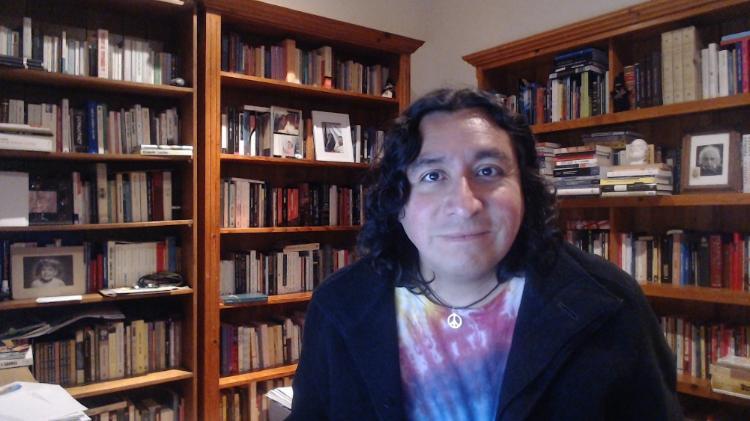
Dr Luis Gomez Romero, Senior Lecturer in the School of Law.
Why did you choose to study your degree?
When I was a boy, I dreamt about growing up into a wise man occupied with sowing beauty in the world. I realised early in my life that some lawyers do not embrace their call to law in these terms. I guess this is the reason why I first wanted to become a poet and a philosopher. I like to look into the origins of words in order to understand the spell they cast upon me. In Ancient Greek, a poet is a ποιητής (poietés), that is, a creator or maker; and a philosopher is a φιλόσοφος (philósophos), or a lover of wisdom. I dreamt of becoming a maker of fairness, in love with wisdom.
My mother was a courageous lawyer who took justice very seriously. She inspired me to pursue my degree in law, without renouncing my original vocation. Quintilian, the Roman educator and rhetorician from Hispania, defined the ideal profile of the legal profession as vir bonus, ius dicendi peritus – a good man who expresses expertly in legal matters. My mother proved every day the patriarchal prejudice of Quintilian’s standards on the legal profession. She was not a vir bonus, but a bonam mulierum – a good woman – whose reading and practice of law was constantly informed by genuine care for those around her, and concern for the common good. Her example showed me that law, when used with good faith, can also lead to fairness and wisdom.
What led to your career as an academic?
When I was young in Mexico, I was an activist for democracy. I was invited to the team of high-level policy advisors to Mexican President Vicente Fox’s transitional government because of my pro-democracy activism. Fox was the candidate of the National Action Party (PAN) who won the presidential elections in 2000, thus ending the 71-year uninterrupted rule of the authoritarian Revolutionary Institutional Party (PRI). Politics demands passion – and I am indeed a passionate man. But politics also requires civic commitment to the common good, a willingness to listen to those with whom we disagree, and humility to change our mind whenever our arguments or decisions are proved unsound. I had grown up under an authoritarian regime, I was young, and I had an ardent yearning for freedom and change. As paradoxical as this may seem, my activism for democracy had not prepared me to be the best politician I could be.
I decided then to take a step back. I realised I needed, in John Milton’s words, to behold “the bright countenance of truth in the quiet and still air of delightful studies” before embarking myself “in the ‘troubl’d sea of noises and hoars disputes” of political work. I undertook my doctoral studies at the Universidad Carlos III de Madrid, in Spain. My PhD thesis is a proposal to read the Harry Potter series of novels as a site for the emergence of significant understandings of the law involving the most pressing social and political problems of the contemporary world. My doctoral research substantiated my interest on the distinctive media, technologies and outlets of youth, which I developed in a postdoctoral research project on the jurisprudential dimensions of comics and video games at McGill University in Canada. While at McGill, I applied for my current job at the University of Wollongong.
Even though Mexico is – geographically speaking – in the Antipodes of Australia, I believe my academic path actually embodies a return to my origins. My current academic work is political, but not partisan. I am interested in examining the narrative life of liberty, equality and justice in the humanities and popular culture, exploring at the same time how, why and to what extent different discourses and media (for example, youth literature, comics, or video games) diverge in their depictions of the functions such values play in society, either facilitating or hampering their effectiveness.
What is the most rewarding part of your job?
Universities are a marvellous invention. The English word marvellous can be traced back to the Latin term mirabilis, which refers to something extraordinary and astonishing that commands our admiration. Since the inception in 1088 of the Università di Bologna, the oldest university in the world, universities and academics have committed to the pursuit of knowledge and truth, which are partners with justice and beauty. These are indeed marvellous tasks! In a wonderful book titled On Beauty and Being Just (1999), Elaine Scarry claims that beauty leads to a greater concern for justice, while justice is the realisation of beauty in our communities. I think Scarry is right. In English, we use the term fairness to name the symmetry or appropriateness of everyone’s relation to one another, and the loveliness or attractiveness of a person or object. I feel privileged in taking part of an ancient and noble tradition that pursues to leave this world even more beautiful than we received it. I feel blessed for sharing such a tradition with my students, who generously teach me every day about the depths of truth, justice and beauty.
What is your teaching philosophy?
The pursuit of truth, justice and beauty demands commitment to freedom. This is the reason why, inspired in the pedagogical work of authors such as Ernst Bloch, Paulo Freire and Jacques Rancière, I conceive education as a communal pursuit of emancipation built on the practice of the affect and virtue of hope. I think that forming and fostering hope is the most precious gift an educator can offer to students. Ernst Bloch refers to the kind of hope that education demands and nurtures as docta spes – that is, an educated hope. This sort of educated hope is an ethical orientation (not simply optimism or wishful thinking) that embodies dreams of a better life infused by liberty and equality. In other words, educated hope yearns for a decent life, free from the arbitrariness of oppression and, at the same time, critical of any form of complicity with oppressive social, political and legal discourses and practices. The nexus between education and hope thus hinges on the unfinishedness of both human beings and the world. Education indeed plays a central role in choosing which possible common futures may become actual. A classroom is a realm of possibility that ventures beyond the present reality, and reaches forward to a transformed future. Such is the huge responsibility we academics have in our role as educators.
How do you motivate students?
I invite students, first, to seriously understand and question the inherent justice or injustice of the normative structures prevalent nowadays in our world and, second, to imagine possible different worlds. This pedagogical practice corresponds to the methodological moments characterizing Thomas More’s seminal work, Utopia. The tradition of utopian thought inaugurated by Thomas More over 500 years ago disrupts the taken-for-granted nature of the present and opens social realities to alternative sets of values. I thus invite students to become true utopians themselves, that is, to reject the falsehood that deems the world we see around us as the best we can muster. The future might always be different because we are building it today. This requires students to practice hope as a call to judgement, not simply about the attractiveness of values such as liberty, equality or justice itself, but also – and primarily – about their inherent fragility. Hope can only take root where its frustration is a possibility, but this is precisely what builds it as a worthy disposition to face the future. This is also the reason why justice demands hope. The pursuit of justice is rarely rewarded with immediate and warranted success. I think there is no motivation more powerful than being aware that though justice may not fully prevail in our lifetime, the fact that men and women have pursued it so tenaciously across centuries is testimony to its perennial value.
Is there an area of law that is important to you? Why?
Jurisprudence, constitutional law and human rights law are the areas of law that I hold closer to my heart. I conceive jurisprudence as a description and critique of how the techniques of law (justice) relate to the demands of action (prudence). Justice is, in this sense, a study into the ways in which history, culture and society determine our conceptions of building community, living lawfully and pursuing justice. Jurisprudence shapes (as it does with every other branch of law) constitutional law, which in turn defines who belongs to the community by determining who is the subject of politics – that is, who is a citizen.
Civil rights are the rights attached to the fact of being a citizen of a constitutional state. Citizenship, however, is a highly problematic political and legal status. The recent ban that barred travellers from India – including Australian citizens – from entering Australia is an eloquent proof of the precariousness of citizenship. Human rights become relevant precisely because of the fundamental instability of citizenship. In a powerful book titled La haine de la démocratie (Hatred of Democracy, 2005) Jacques Rancière explains the ultimate importance of human rights in the following terms: they are the rights of those who have not the rights that they have, and have the rights that they have not. In other words, human rights belong to those who have been arbitrarily deprived of the rights that the law attributes to them, and to those who vindicate the rights that the law refuses to them. This is the reason why human rights are always meaningful for rightless people.
What do you think are your most significant research accomplishments?
I think that the readers who engage with my research are the ones who can really decide on its significance. When I read J. R. R. Tolkien’s The Silmarillion (1977) many years ago, the solemn advice that Ulmo the Vala offered to Turgon, King of the hidden city of Gondolin, left a permanent impression in my mind: “love not to well the work of thy hands and the devices of thy heart.” Turgon’s attachment to the work he invested in building a mesmerizing city of “many towers of great slenderness and beauty” ultimately causes the fall of Gondolin. When a messenger warns Turgon that the enemy forces of Morgoth will eventually march upon Gondolin, he refuses to leave the city. I have always found in Turgon’s fate a sober reminder to avoid attachment to what I can accomplish, no matter how pleased I might feel about the work of my hands and the devices of my heart!
I think my work as a researcher becomes significant if it is accessible to the public through my teaching or other means. My PhD thesis was recognized with an award by the Spanish Youth Institute for its “importance regarding the needs and reality” of the Spanish youth. I am also a frequent media commentator on Latin American law and politics. I have published, for example, more than 40 articles at The Conversation, which have been accessed at the time of holding this interview (June 2021) by over 890,000 readers and republished by more than 490 publishers including, for example, SBS, Newsweek, The Huffington Post, UPI, Univision, CBS News or the World Economic Forum, among other international media and organizations.
What do you consider your best paper/work and why?
Keeping Ulmo’s advice in mind, I do not dare to point out a work that I consider my best research achievement! I can tell you, however, which work is definitively different from everything else I have done before. I invested the last five years working, among other projects, on a play script with my colleague and good friend, ANU Professor Desmond Manderson. The play is titled Twenty Minutes With The Devil, and it will be staged by The Street in Canberra in August 2021. It is inspired by the events leading to the capture of Joaquín ‘El Chapo’ Guzmán, Mexico’s most notorious drug lord, in 2016.
Twenty Minutes With The Devil, however, seeks to transcend its original context. It is placed in a world that is nowhere and everywhere at the same time. The play is, in this sense, a jurisprudential questioning on the current crisis in the structures of global law, politics and justice. It is also one of my most personal works so far. Before I began working in the play I had already realized that global politics is not something that happens far away, but a force determining our lives here and now. I guess this is a realization haunting every immigrant’s experience of solitude and otherness. Working on the play demanded me, however, to focus on this experience by placing my life in connection to the Mexican drug wars and the legally inflicted violence they have unleashed in the land where I was born. For me, co-authoring Twenty Minutes With The Devil was therefore a deeply painful, yet enriching experience that forced me to examine the jurisprudential motives behind my Antipodean exile.
What did it change about the way people approach the field?
I hope that the play contributes to a conversation on how the injustice, cruelty and hopelessness suffered by too many today is not taking place elsewhere or at other times, but actually embody our common future as long as we accept unbridled violence as a means to gain and preserve economic or political power. We inhabit the same space and time than those who are forced to live under legal and political systems that generate scarcity, corruption and mutual antagonism. In this sense, even if we do not ever meet them personally, their grief and anguish is not somebody else’s responsibility. I would deem the play successful if it fosters some reflection on our responsibility toward those with whom we share the world, in Virginia Woolf’s words, not as “disconnected and incoherent” atoms, but rather as “a luminous halo, a semitransparent envelope surrounding us from the beginning of consciousness to the end.”
Did you conduct an internship during your degree? If so, where and how did it benefit you?
In Mexico, law students usually work in a legal firm to achieve some professional experience before completing their degree. This stage in a lawyer’s formation is known as “la pasantía.” As a pasante, I worked for firms specialised on labour and family law. This made me aware of the ways in which law can harm vulnerable people, rather than protect them. This experience sharpened my awareness on the personal responsibility a lawyer holds for the way she or he interprets the law, and accordingly channels through institutional frameworks the client’s demands, plans or desires.
Lastly, what advice would you give to students who are studying law & considering a research career?
The beauty of young people, as Ernst Bloch observes, resides in believing “they have wings, and that everything that is right is waiting for their roaring arrival.” Undertaking a degree at a university, regardless the actual age of students, entails this sort of youthful commitment to hope. I would thus advise students to consider their time at the university beyond the pure pursuit of credentials, and let themselves experience the joy of cultivating their mind and spirit with knowledge developed through free, autonomous scholarship. Even in the post-Covid world of pre-recorded lectures, dual-delivery, and screened and sanitized social interactions, universities can still offer students a few years of experimentation, imagination, diversity and discovery. Do not despair amidst the harshness of our times, because even the darkest of ages cannot deprive you from your creativity and resourcefulness. In his poem An die Nachgeborenen (To Those Who Follow In Our Wake, 1939), Bertolt Brecht speaks of despair only when there is injustice and no rebellion. Let the free pursuit of knowledge kindle your hope. Let your years at the university become the beginning of your own rebellion.
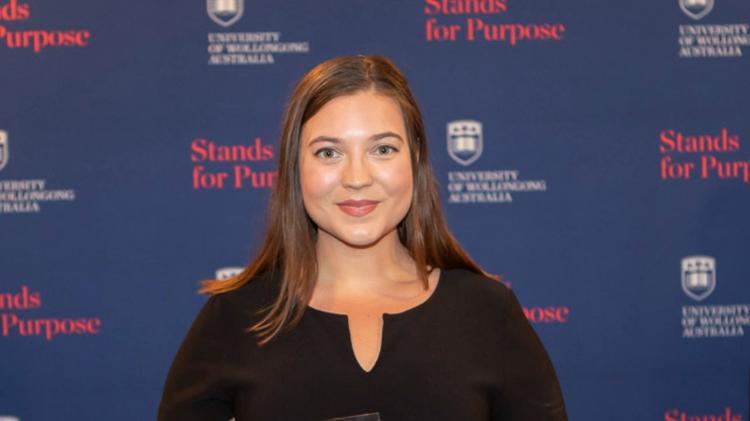
Bachelor of Laws - Bachelor of Commerce
Why did you choose to study your degree?
I have been passionate about social justice since a young age and thought that studying a law degree would be a good avenue to build this passion into a career.
What have you enjoyed most about it so far?
All the extra-curricular activities and opportunities I’ve experienced as a result of studying at UOW.
What area of study is important to you and why?
The practical aspects and implications of the law that we are taught about in class. It’s so important to understand the real-life implications of the theory we are exposed to and how it affects people’s daily lives.
What do you hope to achieve with your degree and career?
It is my aim to be in a career where I am intellectually stimulated, challenged, and able to have a social impact in my wider community. I believe a career in government policy or working in the pro-bono team at a commercial firm will allow me to achieve these goals.
What do you like most about the UOW campus?
My favourite aspect of the Wollongong campus is its environment and atmosphere. It has so much greenery, lawn areas to relax in and a great vibe (as long as there are no angry ducks).
Why did you choose to study here?
I’ve lived in Wollongong my entire life and couldn’t move too far from home due to family commitments. UOW always had a great reputation for its law faculty and after studying here I can see why.
What do you like about Wollongong? Is it a good place to study?
It is the perfect mix of coastal and city. There are enough bars to have a great atmosphere but also very chilled out. This makes it a great place to study as there are always students around for studying and socialising.
Is it easy to get around?
Having the free UOW shuttle bus has made it much easier to get into campus from wider Wollongong. Now that most classes are online, parking on campus is much more accessible.
Have you joined any clubs/societies?
Yes. The main society that I have been involved with has been the UOW Law Students’ Society. Whilst studying, I’ve held the positions of both Equity Officer and Vice President (Education). Being a part of the UOWLSS has enriched both my social life and career advancement through the many people I’ve connected with during my tenure.
What do you think of the student life at UOW?
Student life on campus heavily depends on how much effort you put in to seeking out fun. Many of my friends are heavily involved in different clubs, societies, music gigs and events around campus, whereas others prefer to just study and attend class. UOW student life is unique in that it is easy to get involved but you do not have to feel compelled to.
How did you go about making friends?
I was lucky in that by attending high school in Wollongong, I already knew quite a few faces around campus. I also met new people in my degree through the law pod system in which for the first half of your first year you attend all of your classes with the same 30 students. This made it really easy for us all to bond as we had the same timetable, breaks and classes. Members of my pod are still some of my closest friends after 5 years of uni.
Have you utilised any academic support or wellbeing services?
Yes. A support service I have found very beneficial has been the UOW CareerHub and Resume reviews they provide. It has been great to receive feedback on job applications before submitting them and having a fresh perspective.
Did you receive any scholarships? If so, which one(s)?
Yes. As a future student I was awarded an academic scholarship for my commerce degree before attending UOW. This provided financial support for the first 3 years of my degree.
I was recently awarded the Jack Goldring Memorial Scholarship for my commitment to social justice throughout my studies.
How has it benefited you?
The financial support given through these scholarships has been highly beneficial for both my mental health and career aspirations. They have provided a bigger net of financial security, allowing me to focus more rigidly on my academic success and extracurricular passions. This has helped me to better understand my personal passions and gain a better understanding of my future career path.
Have you conducted your internship? If so, where, and what are the benefits of the Legal Internship Program (LLB397) being a core subject?
Yes. I was fortunate enough to receive a New Columbo Grant which allowed me to undertake my LLB397 internship in Kuala Lumpur, Malaysia. Living overseas for the month was a once in a lifetime experience. I was able to fully immerse myself in a foreign culture, whilst working full time at a highly regarded commercial law firm. Without LLB397 being a core subject, I never would have been able to experience this international work placement or gain the necessary legal research skills I developed through the internship.
What did you learn from you time at your internship? What news skills or opportunities did you receive?
Many of the skills I developed through my internship were soft skills outside the legal scope, due to differing cultural expectations in the workplace. It was interesting to see the differing work environments and cultural nuances at play in Kuala Lumpur, which I was required to learn quite quickly.
I also had the opportunity to further develop my legal research, drafting and communication skills through my internship. We were fortunate enough to attend various court hearings in Kuala Lumpur and learn about Sharia Law.
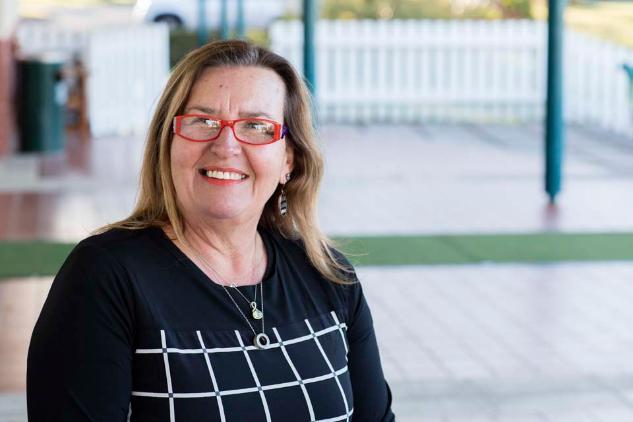
Dr Virginia Marshall is a UOW alumni Scholar, Researcher and Author, and Principal Solicitor at Triple BL Legal.
Degrees: Bachelor of Arts (Honours) - Bachelor of Laws, 2002; Graduate Diploma in Legal Practice, 2003; and Graduate Certificate in Laws (Criminal Practice) 2017.
Why did you choose to study your degree?
I studied three degrees concurrently. Law, the Arts and Education was, in hindsight, the right choice. They offered a career and opportunities to build a future that I needed to support my four children.
Why did you chose to study at UOW?
I live in a rural area and needed to be accessible and available for my children. In relation to Education, this offered a strong and supportive Aboriginal Education Centre with staff that really invested their time and energy for Indigenous students. They fed us too.
Was there an area of study that was important to you?
Education and Law really challenged me in every way. Once I got to third year I could see the possibilities and the impact I could make. I studied human rights in undergraduate and postgraduate and this was, and still is, a passion.
What did you like most about the UOW campus?
The lush surrounds of the Aboriginal environment, the access to the study facilities, the very reasonable food stalls (chips and gravy meant eating or not eating). There is peace that exists in this place is very special.
Did you join any clubs/societies? If so, which clubs & why?
With four children I had limited options, running from uni to home and back. I was offered, and accepted, a committee position as Aboriginal and Torres Strait Officer with the UOW Student Body and was a member of the UOW Law Students’ Association.
What do you think of the student life at UOW?
I think student life, no matter your circumstances, is challenging in the beginning and towards the end of your degree it is empowering. Graduating in person has and will always be a very emotional moment.
Did you receive any scholarships? If so, which one(s) and did they benefit you?
I applied for competitive equity scholarships and these made university possible. These scholarships are a lifeline and they should be on offer for every student who does not have the money to study. I had to maintain my grades and that was always in the back of my mind.
I left high school at 16 and when I went to join the Defence Force, having completed a couple of degrees then, the door was shut because I hadn’t completed year 12. Being admitted as a solicitor was a defining moment. I love the law.
Did you conduct an internship during your degree? If so, where, and how did it benefit you?
I was accepted for an internship at the Legal Aid office in Wollongong in its civil law section. There were no Indigenous graduate positions available at this time. When I was admitted I returned to Legal Aid NSW in Wollongong as a criminal defence lawyer. The Legal Aid staff were wonderful, especially amazing and kind were the admin staff.
What skills and experience did you gain during your degree that helped once you entered the world of work?
Perseverance and determination, in bucket loads. The research skills learnt were invaluable in law.
What do you do for work now and what was the journey that got you there?
I am Principal Solicitor in my own firm TripleBL Legal and the inaugural Indigenous Postdoctoral Fellow at the Australian National University, Canberra. In many interviews I’ve attended the question put to me was: You have to choose whether you want to be a judge, barrister, academic or researcher. I don’t agree. Scholarly writing and research gives a depth and reflection that is needed for legal practice. The discipline in studying law trains the whole person. Indigenous law embeds a holistic appreciation and value in the world around you.
What opportunities did your degree open up for you?
I have studied and completed many degrees because I needed to have the education and opportunities that were not open to me before. It also opened my eyes to other issues and global challenges.
Did you always know where you wanted your degree to take you?
I didn’t have a career plan. My children were the motivation I needed every day to get through my study.
What advice would you give to students who are aiming for a career path similar to yours?
I haven’t met anyone that has done what I have done. One thing you must have is passion and resilience.
Is there anything you would like to say on UOW School of Law’s 30th Anniversary?
I am very honoured to serve on the University of Wollongong, School of Law Advisory Committee. As a regional university, UOW plays an important role in providing a university education to local residents, as well as international and domestic students. UOW lies on significant Aboriginal lands and waters that provide the generational integrity and ancient heritage to this place. I wish the Law School, staff and students and alumnae time to reflect on what we have achieved, together. Marambangbilang!
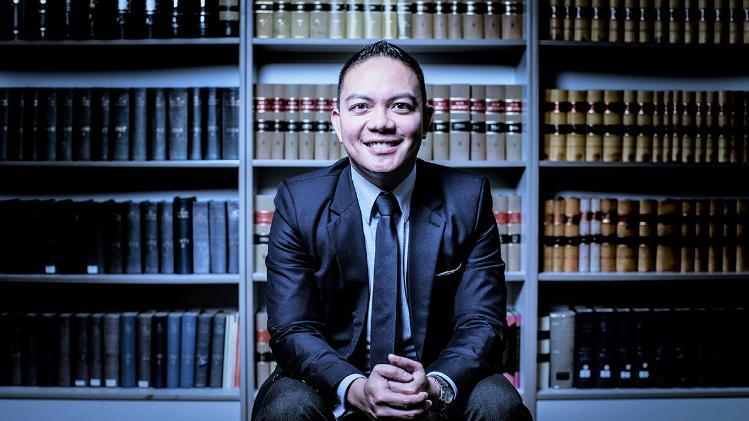
Dr Lowell Bautista
Senior Lecturer and Head of Postgraduate Studies at the School of Law and the Australian National Centre for Ocean Resources and Security (ANCORS).
What led you to your career as an academic?
My foray into academia was entirely fortuitous. But looking back, I have no regrets. After I completed my law degree and was admitted to the Philippine Bar, I started my own private practice and later joined a leading law firm in the Philippines. I enjoyed law practice but my deep interest and passion for the law of the sea brought me to Dalhousie University in Canada where I completed my LLM, and then afterwards to the University of Wollongong for my PhD.
The supportive work environment at UOW and especially at ANCORS facilitated my career as a full-time academic. The institutional setting at ANCORS not only enhanced my research capability and international profile, it also offered exceptional opportunities for wider dissemination of my research capitalising on already existing national, regional and international collaborations and partnerships. I had the good fortune of having supportive mentors, who provided me with opportunities to build working relationships and collaborate with colleagues, both in Australia and overseas, which further solidified my reputation as a recognised researcher.
Other than research, I also discovered that I love teaching. I have always had a passion for learning, a strong sense of purpose to help others, and to make a positive impact on the lives of people around me. My career in academia allows me the privilege to pursue my research interests and provides the opportunity to help shape the lives of my students. It is the best job in the world. I cannot think of any other job or career, which is more noble or more rewarding, or one having such a critical role in society as teaching. Being a teacher in law school, I am always reminded of the words of Justice Oliver Wendell Holmes, Jr., who said that, “The business of a law school is not sufficiently described when you merely say that it is to teach law or make lawyers. It is to teach law in the grand manner, and to make great lawyers.” Law schools are not mere factories of lawyers who know what the law is, but of people who are life-long learners, problem solvers, individuals who have integrity and a spirit of excellence, future leaders who will uphold and fight for truth, fairness, and justice.
Are you currently working on any research papers?
I consider myself very intellectually curious, always fascinated by everything, and constantly ruminating about things. I am always working on several writing projects at any given time. At the moment, I am working on three book manuscripts; two are co-authored: one on Africa and the law of the sea, and another on territorial and boundary disputes, and a third one, where I am the sole author on Philippine territorial and maritime claims. I do hope to see these books published in the near future.
I am currently on secondment at ANCORS where I am working on a project funded by the Australian Department of Foreign Affairs and Trade (DFAT) on enhancing coordination among domestic maritime agencies of Vietnam, Malaysia, the Philippines and Indonesia.
What do you think are your most significant research accomplishments?
I am recognised for my expertise in the law of the sea, particularly for my contributions in the area of territorial and maritime disputes in the Asia-Pacific, especially the South China Sea. My research primarily involves multi-faceted aspects of international law, ocean governance, the law of the sea, maritime security, and comparative law.
The quality, breadth of coverage, impact, and volume of my research output are testimonies to the excellence of my research skills and my contributions to specific areas of research. My strong publication record relative to experience and my contributions to research on territorial and maritime disputes in the South China Sea, have consolidated my position as a key researcher in this field. I am a recognised scholar with an established and solid track record of research publication and active research collaborations with government and academic institutions and scholars across the Asia-Pacific.
Since 2010, I have published 3 books, 15 book chapters, 16 refereed journal articles, and have presented in over 20 international conferences. I published 7 refereed journal articles from my PhD thesis, 5 of which were published before completion of my PhD.
In 2018, I was selected as an Arete Research Champion for being one of top 20 researchers in the Faculty of Law, Humanities, and the Arts. In 2018, I was selected as one (out of 43) early-to-mid-career academics at UOW as part of the UOW Impact Makers, which recognises academics whose work delivers real change to society. This recognition acknowledges both the value of my contribution and my standing as a researcher within UOW. In 2012, I was awarded a UOW Vice Chancellor’s Postdoctoral Research Fellowship for my research entitled, ‘Diffusing tensions in the South China Sea: The role of regional institutions and mechanisms in managing conflicts over territorial and maritime boundary disputes.’ The Vice Chancellor’s Postdoctoral Research Fellowship Scheme was established ‘to support outstanding early career researchers to undertake full-time research’ in recognition of their ‘highly competitive track record relative to opportunity,’ and an ‘innovative program of research with the potential to make a significant contribution to the University’s research profile and priority research areas.’
What do you consider to be your best work and why? What did it change about the way people approach the field?
The research and projects I have conducted have had a profound impact on legislation, public debate, and policy. This application builds upon and expands over a decade of research, teaching, provision of training and capacity-building in the area of public international law and multi-faceted aspects of the law of the sea.
My published works on Philippine maritime and territorial boundaries, especially on the Treaty Limits, have filled a gap in academic literature and have been used widely by academics and policy makers in the Philippines. My research and publications on the Law of the Sea dispute settlement mechanisms, especially in the context of the South China Sea disputes, following a legal, practical and contemporary approach, have informed policy debates, enriched the academic discipline and opened doors for valuable research collaborations with scholars doing similar research across the Asia-Pacific and beyond. On numerous occasions, I have had the privilege to teach, deliver lectures, provide confidential advice and opinions on matters pertaining to offshore oil and gas resources, the law of the sea, the South China Sea, maritime boundary delimitation and public international law to the Philippine government and its various department and agencies. I am always proud to give back to my country of birth.
Over the course of two decades, I have participated in numerous research and consultancies, as well as in the preparation of submissions, opinions, and reports for international and regional organisations, as well as government department and agencies, both here in Australia and overseas. These reports and submissions have informed policy, guided decision makers, assisted government and inter-governmental agencies in critical studies of national and international impact.
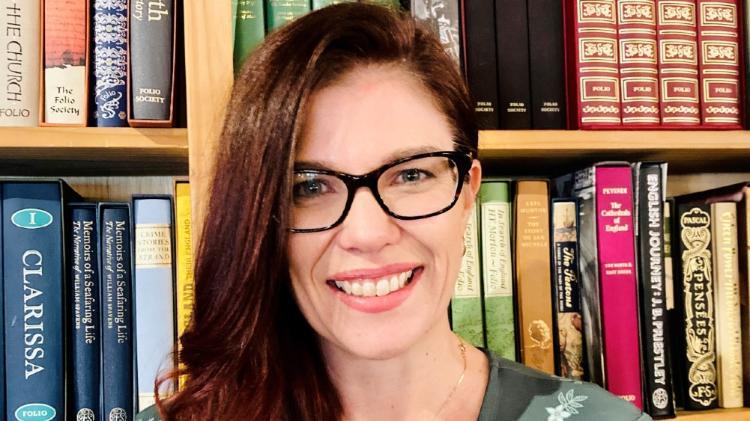
Associate Professor Cassandra Sharp
What led you to your career as an academic?
I have always been excited about the prospect of understanding how law actually worked in our society, and was intrigued by the way law seemed so embedded in all aspects of life. This was only confirmed during my undergraduate studies where I discovered that my particular passion was for research and exploring the theories of law rather than practicing it. After one year of graduate employment in legal publishing, I quickly wanted to return to a place where I could think critically about the law and question its role in society, not only for myself, but to encourage others to do the same. So began my academic career which has now spanned over 20 years.
Are you currently working on any research papers?
I am currently finalising a book that offers a theory of law that binds together the experience of terror, the encounter of legality, and the expression of emotion all within the narrative forms of social media (Hashtag Jurisprudence: Terror and Legality on Twitter, forthcoming 2021, Edward Elgar). Utilising empirical analysis, the book examines the stories that are interpreted and produced through the medium of posting, texting, commenting and hashtagging in relation to terror events, in order to expose the desires for legality in the public eye. Using terrorism as a case study, the book’s central argument is that both law and social media are constituted in narrative, and that global terror events provoke an opportunity to interpret (and then retell) the ways in which individuals view their place in the world, and their relation to law within that context. In doing so, a ‘hashtag jurisprudence’ is constructed.
What do you think are your most significant research accomplishments?
I have built a profile as an interdisciplinary scholar with qualitative expertise in the field of law, popular culture, and public perception. My primary research interest lies in the exploration of law as it is constructed in the public imagination through popular texts. My work is interdisciplinary because it deploys empirical methods often lacking in studies of law and humanities (focus groups, interviews and social media discussions); and also, because it draws on and develops cultural studies, linguistic theory, psychology, and legal theory to interrogate public interaction with the law. In my research, I have consistently sought to explore the reception and understanding of policy, legality and justice through a qualitative analysis of public responses in popular culture and within social media. One of my significant contributions within the field of cultural legal studies is the development of an internationally recognized empirical cultural legal studies methodology which employs a mix of jurisprudence, cultural discourse analysis and linguistic coding to explore the transformation of meaning about the law in everyday society. Representing a new strand of scholarship, this methodology impacts cultural legal studies by providing access to nuanced perspectives and values as articulated in public conversation that is not otherwise attainable.
What do you consider to be your best paper/work and why? What did it change about the way people approach the field?
Throughout my research career I have consistently argued that the public imaginary is constituted in and through law when individuals speak about their primary emotional reactions to societal events and legal processes. As individuals tell of their reactions to law’s processes and practices, they reveal their underlying values, attitudes and expectations. I have published widely on the theme of storytelling in the law and how individuals use stories to understand and legitimize law in our society. My work describing the use of narrative as a way of understanding law, extends the scholarship on law and popular media. My publication ‘Finding Stories of Justice in the Art of Conversation: Ethnography in Cultural Legal Studies’ in Sharp Cassandra and Leiboff M (eds) Cultural Legal Studies: Law’s Popular Cultures and the Metamorphosis of Law (Routledge, 2015), demonstrated that when individuals speak about socio-legal issues, they inscribe themselves into the story, and contribute to communal understandings about law and its role in society. This then has the cumulative impact of facilitating a shared cultural consciousness through which a collective voice is often formed, which in turn makes legal meaning visible and contestable. This theoretical understanding has formed the basis for my ongoing empirical research and contributes to the scholarship on law and narrative by interweaving practical empirical results with theoretical constructs.
Do you currently receive any funding and, if so, tell us a bit about the project.
I have recently led a project which received funding through a UOW Global Challenges grant (Hashtagging Terror 2019). This project sought to produce multi-disciplinary insight to people’s attitudes to law during terror attacks and was conducted by a team of scholars across law, business, psychology and linguistics. The project focus was the Christchurch Mosque Terror Attack in 2019 and analysed responses on Twitter to assess how individuals and communities coped with such an event.
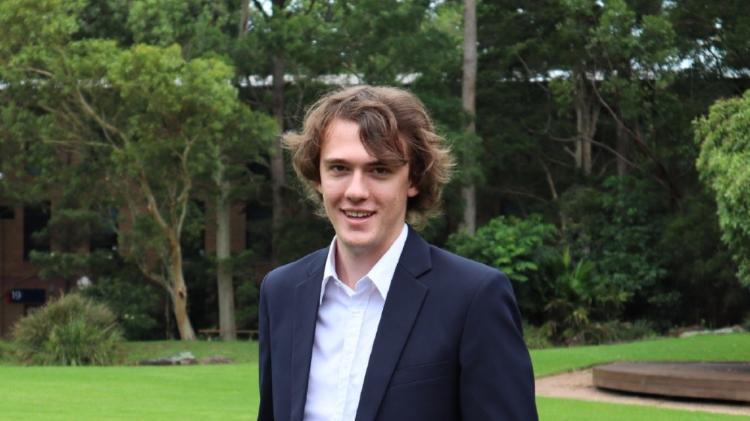
Bachelor of Laws (Honours) and Bachelor of Engineering (Honours) (Mechatronics)
Why did you choose to study your degree?
In High School, I was much more focused on mathematics and sciences rather than English and other humanities subjects. However, no matter the subject, I enjoyed arguing a position to convince a person (often my teacher who marked harshly) or even an audience. This passion for advocacy of a point of view is what led me to commence a law degree at the University of Wollongong. I also enjoyed the ability to apply an analytical and evidence-based approach to written argument in words rather than numbers. These two factors led to my decision to study the law, although it would be remiss not to mention the fact you get paid to prove other people wrong as another motivating factor.
I chose to study this degree combination as I felt it offered a wide range of transferrable skills, allowing me to practice in areas that interested me. This combination is also relatively unique, giving me the chance to explore a niche area of the law which could lead to a future specialty. Overall, I was interested in studying each of the degrees individually, so the double degree offered a good opportunity to explore multiple career pathways in a shorter time.
What have you enjoyed most about your degree so far?
The Law School has developed some unique delivery methods which I feel really support learning, such as first-year PODS and the LLB3397 Internship. Whilst the core subjects of the degree can offer challenges and learning opportunities, it is the co-curricular activities and community that I enjoy most at UOW. The Law Students’ Society offers lots of practice-based competitions and events which give a look ahead into what legal practice may be like after attaining an ever-precious practising certificate. Students at UOW always seem to be ready to support each other, whether through formal programs like Peer Assisted Learning, through education initiatives of the Law Society or just informally, providing day-to-day help to each other. I find the ‘we are all in this together’ mentality at Wollongong to be one of the greatest features of UOW (which shines through in class, through the campus and even sometimes on UOW Rants).
What area of study is important to you and why?
Through my studies in Law, I have come to appreciate and enjoy litigation and dispute resolution in all areas of study. Criminal and administrative law have offered up the occasion to use these skills which I have enjoyed, although every area of study offers new insights into the last and as such it is hard to draw out which I believe is the most important.
At the end of your studies, what do you hope to achieve/do with your degree?
At the end of my degree, I am looking towards taking on an associateship or continuing with further study through a PhD. Later in my career, I am looking towards venturing to the bar with the possibility of one day becoming a decision-maker or getting involved in policy development such as through the Australian Law Reform Commission. Through these roles, I hope to work towards a stronger, more equitable and fairer Australia. Whilst the engineer in me says ‘if it ain’t broke, don’t fix it’, the lawyer in me likes looking at systems that appear to ‘work’ and then make them even better.
What do you like most about the UOW campus?
The UOW campus offers an ideal space for peers to come together, whether that is to study, get involved in sport, have a snack or get a drink. I find the natural environment throughout the campus creates a pleasant and relaxed vibe, unless you are running to turn in an assignment. I feel the spaces throughout the University and the natural feel of the campus are a lot more friendly and welcoming than an office building in the middle of busy city streets. The proximity of the University to town also makes it easy to head out for dinner or drinks with friends after a long day of classes.
Why did you choose to study here?
The University of Wollongong offered a number of advantages over other universities. The University offers a great, refreshing campus to study on, has a unique degree program and features a collegial attitude towards study. I also chose to study here as it offered the degree program I was looking towards, had great scholarship opportunities and was located closer to family and friends.
What do you like about Wollongong?
Wollongong is a great environment for university students. It provides a mix of both city and more regional life. The CBD offers many opportunities to find work and places to socialise, which are within a quick drive of all the surrounding suburbs. This means a share house near the University, the town and the beach is a real option for students studying in Wollongong, allowing them to have a healthy university life throughout their degree.
Is it easy to get around?
Thanks to the free busses provided by the University, getting around near the University is easy and best of all, free. This also means that students can catch a train to North Wollongong Station to get a free bus to the University, assisting to keep public transport a viable option for all students at UOW. I try to make use of the free North Wollongong bus as it offers a convenient way to get to the University whilst avoiding paying for parking.
Have you joined clubs/societies? (Which clubs & why?)
From my second year at UOW I got involved with the University of Wollongong Law Students’ Society. The Society organises events, competitions and initiatives for law students studying at UOW. Joining the Society gave me great opportunities to network with other law students and professionals, build up experience related to legal practice and have some fun whilst doing it. Being an Executive of the Society has also given me the ability to start new initiatives at the University to benefit fellow students in their studies. Through the Law Students’ Society, I have taken part in mooting and other skill-based competitions which have been a great experience and have been a key step in professional development throughout my degree.
I am now also a Committee Member of the Australian Law Students Association where I assist to deliver resources to Law Student Associations/Societies around the country. I took on this role as it allows me to contribute at a national level and further expand my network.
What do you think of the student life at UOW?
I really enjoy the student life at UOW, which can be seen by my substantial involvement with clubs, co-curricular activities and ‘student politics’. I think the University is a collegial place and I always enjoy working together with friends and fellow students on projects at the Uni, especially where they end with a debrief at UniBar. There are plenty of opportunities to get involved, meet new people, and get some experience for your resume all whilst having a good time. UOW also offers lots of ad hoc activities throughout the year which liven up the campus, and it has been great to see lots more activity on campus so far in 2021.
Have you done any co-curricular activities (UOWx, paid, volunteer etc)? Have any of these things benefited your study?
I am currently a Student Member of the University Council and the Academic Senate, bodies which make decisions about the operations of the University. These activities have given me an insight into the complex body the University is, and the way policies affect various stakeholders, similar to how laws affect a country’s people. From these roles I can practice many skills which will be relevant later in my career, such as corporate governance, assisting with policy drafting, advocating for a decision or change in the University, and writing evidence-based reports to promote said change.
In 2018 and 2019 I was a digital media ambassador for the University of Wollongong and made appearances on their Instagram and Snapchat stories. This helped me find my feet at the University while also gaining the opportunity to be involved in various events through social media channels. In 2020 I secured a position as a research assistant with the University at the Australian National Centre for Ocean Resources & Security. This allowed me to put the research skills I had been learning in my degree into practice, whilst also giving me insight into academia, influencing me to undertake honours this year for my law degree.
Did you receive any scholarships? I so, how have they benefited you?
In 2018 I was lucky to be awarded the George Alexander Foundation Scholarship as well as the Vice-Chancellors Academic Excellence Award Scholarship. In 2020 I was awarded the Acorn Lawyers Scholarship and in 2021 I received the Business and Law Faculty Honours Scholarship.
How have they benefited you?
These scholarships have given me the financial freedom to focus on my studies as well as pursue many extracurricular activities to support my higher education. This has included involvement with many university clubs and societies, volunteering my time at community organisations and representing the undergraduate student cohort at University Council, Academic Senate and on the Student Advisory Council. The University’s Accommodation Bursary which I received in 2018 also provided a great experience to start my time at the University of Wollongong. Scholarships also offer great networking opportunities which can even lead to future jobs. For me, the scholarships have offered a great chance to get recognition of my achievements both at university and in the wider community and I would strongly recommend people interested in scholarships apply when they get the opportunity.
Have you conducted your internship? If so, where, and what are the benefits of the Legal Internship Program being a core subject?
In the 2019-2020 summer break I completed my LLB 3397 Legal Internship at the Illawarra Legal Centre. Having a mandatory internship as a part of the degree pushes you to look for opportunities to expand your education outside of the classroom. By completing an internship before you finish your degree you are able to get a head start in the job market and gain valuable insight into what legal practice is really like.
What did you learn from you time at your internship? What news skills or opportunities did you receive?
After my internship at the Illawarra Legal Centre with their Welfare Rights Solicitor, I continued volunteering at the centre for one day a week. Towards the end of 2020, I was offered a paid position as a part-time caseworker which I graciously accepted. Getting to work so closely with a solicitor over this time has allowed me to develop important skills for practice in areas such as advocacy, developing arguments and general practice management in a law firm. The team at the Illawarra Legal Centre provided a great environment to learn the ropes of legal practice, featuring a great working environment with friendly and knowledgeable staff for me to learn off.
My time at the Centre has certainly left a mark on me personally and professionally, and after interning I am certainly better off. Specifically, working with the Illawarra Legal Centre has significantly grown my interpersonal communication skills, especially in the areas of interviewing clients and advocating for clients to decision-makers (both in written submissions and oral submissions). It is safe to say after my time here my confidence in presenting arguments has certainly grown, as have my skills developing those arguments. At the end of 2020, I had an unrivalled experience developing key skills when the solicitor I worked with unfortunately fell ill and I was left as the only caseworker in the department, reporting directly to the principal solicitor. Whilst this time did lead to a lot of responsibility and stress, it also offered a great opportunity to take a more front-end role in cases at the AAT and gave me an even better insight into life as a practising lawyer.
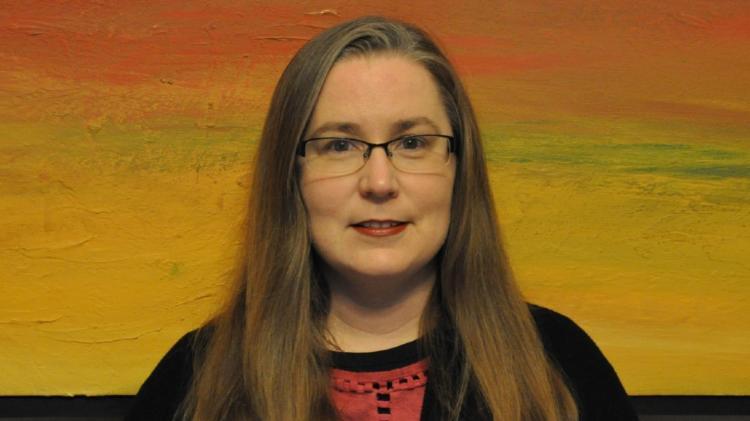
What led you to your career as an academic?
I completed a combined LLB (Honours) and BSc (Environment) degree at UOW in 2001. After finishing my undergraduate studies, I worked in Sydney as a Tipstaff to a Judge of the Land and Environment Court of NSW and then as a solicitor with the NSW Office of Environment and Heritage. After moving back to the Wollongong area, I decided to make the move into academia. I started teaching with the UOW Law School in 2012 and commenced my PhD thesis examining the effectiveness of the pollution regulatory system in NSW the following year.
Are you currently working on any research papers?
I’m currently working on a number of research papers within the area of environmental crime and enforcement, as well as waste management. One of the papers I’m working on considers how enforceable undertakings – which can be utilised as an alternative regulatory tool to prosecution – have been used in NSW pollution law. The paper examines the enforceable undertakings that have been entered into to date and considers the importance of ensuring transparency, accountability, certainty and environmental outcomes in the enforceable undertakings process and how these aspects might be improved.
What do you think are your most significant research accomplishments?
As an early career researcher one of my most significant research accomplishments was the completion of my PhD with the UOW School of Law in 2019. My thesis aimed to assess the effectiveness of components of the current pollution regulatory system and its regulators in order to recommend meaningful changes for the next generation of laws. I’ve published a number of journal articles and book chapters stemming from my PhD research. This includes research focusing on topics such as alternative sentencing orders, the use of judicial review and merits review to hold pollution regulators to account, the duty to report pollution incidents and the use of economic instruments in pollution law. Since completing my PhD I’ve moved on to examine other areas of the environmental regulatory system and environmental crime, compliance and enforcement. My research is significant in that I have utilised both quantitative and qualitative analysis to assess the effectiveness of aspects of the environmental regulatory system, such as sentencing orders imposed on environmental offenders.
What do you consider to be your best paper/work and why? What did it change about the way people approach the field?
My best paper is perhaps my article: Sarah Wright, ‘Re-examining the Approach to Alternative Sentencing Orders in New South Wales Pollution Law’ (2018) 35 Environmental and Planning Law Journal 606. There are a range of alternative sentencing orders (ASOs) that can be imposed for environmental offences in NSW, such as orders to carry out, or pay for, an environmental project and publication orders. While the general principles for sentencing environmental offenders are well-established, I argued the principles were not as well developed for some of the ASOs. I examined how ASOs had been used in NSW pollution law using quantitative and qualitative analysis, and also re-examined the principles underlying these orders. As far as I’m aware, there had not previously been a detailed analysis of this nature. The goal of my article was to encourage reconsideration by the regulators and the courts of the way ASOs are used in practice and refinement of the relevant principles.
Do you currently receive any funding and, if so, why do you think they were interested in funding your project?
I’m currently working with a UOW interdisciplinary research team and an external research partner on a project titled ‘Benchmarking, Characterising and Valuing the Resources in Household Bulky Waste Clean-up Services’. The project was funded by the UOW Global Challenges Seed Funding program and our research partner organisation, the Illawarra Shoalhaven Joint Organisation (ISJO), which is comprised of four member councils across the region. Improving the management of all types of waste is currently a key issue for governments within Australia, particularly given the recent push by the Commonwealth and State governments to move towards a more circular economy. The project examined council clean-up services in relation to household bulky waste items, such as wooden furniture and lounges, and made a number of recommendations to support councils with improving the management of this waste stream. A key focus within the research was to consider ways in which household bulky waste could be diverted from landfill by increasing the reuse and recovery of materials within these items. Part of my role on the project was to examine the law and policies underlying the management of this waste stream.
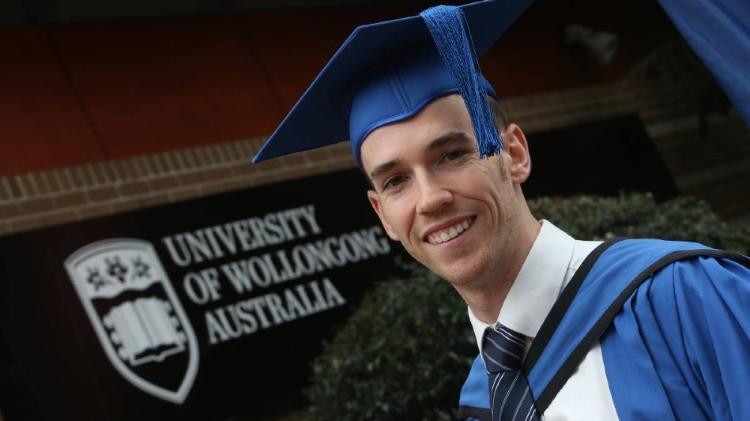
Solicitor at the Office of the Director of Public Prosecutions (NSW)
Degree: Bachelor of Commerce, Bachelor of Laws, 2017
Why did you choose to study your degree?
I decided to study a double degree in law and commerce given its versatility. I believed that I wanted to enter into legal practice post-graduation, but one isn’t really sure until they’re on the ground and operating. I felt that the addition of commerce would open up doors if necessary, including for instance pursuing accountancy (which was my major), or even high school teaching.
Why did you chose to study at UOW?
I had originally commenced my studies at ANU but, for a few reasons, decided it was not the right time for me. I was only 17 years of age at that point and wanted greater life experience before properly engaging in tertiary education. In that context, I chose UOW for the following reasons. First, Wollongong has a much more temperate climate than the extremes of Canberra. Second, the beautiful coastline upon which Wollongong rests. Third, the close proximity to Sydney by car and train. Fourth, I had the sense that the university and lifestyle setting of Wollongong was more relaxed and enjoyable than that of other universities and cities.
Was there an area of study that was important to you?
My vision was to become a criminal law practitioner. In those circumstances, law was my focus, and particularly the criminal law and evidence subjects offered by the university. To this end, I really enjoyed both foundational criminal law subjects, the criminal law elective which explored contemporary and intriguing issues in the criminal justice system through a number of guest speakers including Nicholas Cowdery AO QC, and Mark Tedeschi AM QC, and my honour’s thesis, which explored governmental intervention on bail laws in NSW, Qld and Vic.
What did you like most about the UOW campus?
The UOW campus is has beautiful green lawns, various ponds, a number of sports fields, tennis courts, squash courts, swimming pool, gym, basketball/netball courts, a nice modern library and plenty of cafes. It is peaceful, quiet, and naturistic and an ideal studying/learning/social environment.
What do you think of the student life at UOW?
I lived at Marketview, which is modern hotel-style accommodation in Wollongong’s CBD. From memory there were around 144 student residents. It was an amazing experience and I reflect on this time fondly. Here, I met some of my best friends, the social life being absurdly accessible, and something always fun and interesting going on. I always encourage students to live on campus for at least a year as those times for me were some of the best.
Did you receive any scholarships and, if so, how did it benefit you?
I applied for and was granted a five-year scholarship from a law firm with a generalist practice located in Wollongong which employed around 20-25 staff. This afforded me a guaranteed 50 days of work per year and provided solid financial support to assisting in my years of study. That experience was extremely useful in getting practical experience and skills across a broad range of legal areas including criminal law, property law, civil litigation, contact law/transactional work.
I was also awarded scholarships from UOW to assist for each of my two exchange programs. I studied for a full semester at each the Colorado University in Boulder, and Aarhus University in Denmark. Great times were had.
Did you conduct an internship during your degree? If so, where and how did it benefit you?
UOW offered a program whereby students could apply to spend a day with different Judges, through which I was fortunate to spend a day each with District Court Judges Richard Cogswell SC and Andrew Haesler SC. This gave me real insight into how judges work, what judicial chambers are like, what kind of support judges receive, and what their day-to-day lives look like. To this end each Judge was extremely kind and giving with their time.
I also had the fortune of working as Associate Professor Julia Quilter’s researcher for a number of years. Julia largely conducts research and publishes articles on contemporary issues in criminal justice, which was, of course, right up my alley.
What do you do for work now and what was the journey that got you there?
I work as a solicitor with the Office of the Director of Public Prosecutions. The Director is responsible for prosecuting indicatable offences in NSW, which encompasses serious assaults, drug supplies, sexual offending (which occupies a substantial part of our work), and a range of other offences right up to murder. Given the seriousness of these matters, we generally work in the District Court of NSW and Supreme Court of NSW.
I had always wanted to join the ODPP. I thought that I would apply after finishing my studies at UOW. However, I ended up successfully applying for a “tipstaff” position with Justice Natalie Adams at the Supreme Court of NSW. A “tipstaff” role is an interesting one and varies depending on the judge you work for, noting that there are around 60 Supreme Court judges. I was largely tasked with researching, writing, organising material, and sitting alongside and assisting Justice Adams when in Court. This was a fabulous experience.
Following the completion of my tipstaff role, which by general course only run for around 12 months, I commenced an “Associate” position with Justice Virginia Bell at the High Court of Australia, having applied in my final year at UOW. This too was an exceptional opportunity to learn. The work largely involved assisting in research and analysis of special leave applications (which are applications to have an appeal heard from an intermediate appellate court, such as the Court of Criminal Appeal of the Supreme Court of NSW, or the Full Federal Court), and similar work in respect of appeals and a range of Constitutional matters. I worked with Justice Bell for 12 months and have been in my current role since.
What advice would you give to students who are aiming for a career path similar to yours?
Achieving good marks on a consistent basis demonstrates an interest in law, dedication, and intellect (or a combination thereof), and prospective employers assessing graduate applicants give your transcript significant consideration. This is even more case when seeking to apply for roles such as a judicial tipstaff or associate. That being so, I would encourage students to study in a focussed and dedicated manner, without going overboard. I would also encourage students to get part-time employment in a local law firm as they feel that they’ve lived the university experience (whatever that may look like!) so that the skills and experiences that are fundamental to practice become enshrined by graduation. This will give you a very solid base of understanding and confidence moving forward.
Is there anything you would like to say on UOW School of Law’s 30th Anniversary?
Thanks to the amazing teachers I was fortunate enough to learn from during my time at UOW’s School of Law – Julia Quilter, Mark Saunders, Sandy Noakes.
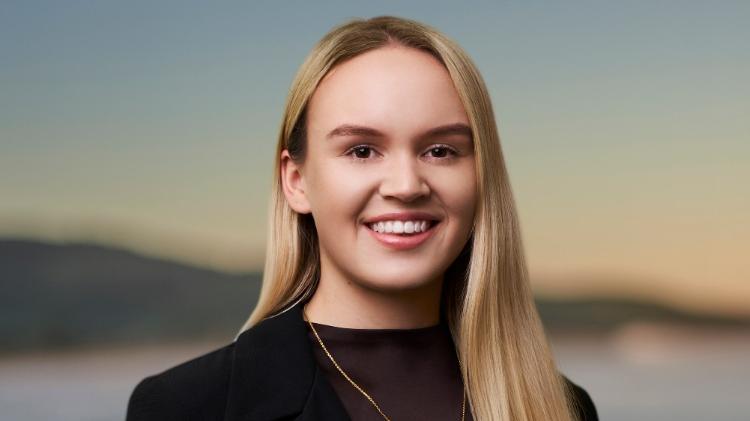
Law and International Studies (minor in Indonesian Language)
Why did you choose to study your degree?
I chose to study law because I knew it would be a degree where I could explore abstract concepts relating to justice and morality whilst also practically applying what I was learning to everyday scenarios. In this sense, I liked that the study of law had outlets for me to express both my creativity and desire to create change but also the part of me that was drawn to objective, logical reasoning.
What have you enjoyed most about it so far?
Through studying law at UOW I have developed a real sense of purpose. By studying law, I am challenged every day to think critically, develop my own opinions, weigh up information objectively and listen to the views and life experiences of others that often differ greatly from my own. Because of this, I am more assured of my own views, I am more critical of information presented to me and I have a deeper sense of justice that comes from being exposed to so many different perspectives about what is fair and just. These skills make me a more interested and engaged learner not just within the study of law but in all other aspects of my personal and professional life. I’ve lost count of the amount of times someone has told me that studying law must be “so dry” but in my opinion, this couldn’t be further from the truth.
What area of study is important to you and why?
Instead of having one area that is particularly significant to me, across all areas of study I see reoccurring issues and themes that are very important to me. It is important to me to be able to look any area of law and ask, “what narratives are being prioritised here and which are being excluded?”. I am interested in the way that the law treats our First Nations peoples, different racial groups, women, low-socio economic groups, culturally and linguistically diverse people and the LGBTIQ+ community. In every area of study from property law to constitutional law to contract law you will find these issues if you just look. It is extremely important to me that amongst all the objective reasoning of the law, I remember to ask more abstract questions and consider who is being excluded and harmed by the dominant narratives our legal system.
At the end of your degree, what do you hope to achieve? (career, why, impact)
At the end of my degree, I hope to feel as though I have maintained my passion for the law and thirst for knowledge which I will carry into a graduate job within the legal profession. I hope to feel as though I am progressing towards my dream of becoming a barrister and continuously learning from those around me. I want to ensure that wherever I end up, I am still committed to questioning those deeper, abstract issues relating to justice, equity and morality that are embedded within the law.
Why did you choose to study here?
Throughout year 12 and especially towards the end of my final year at high school, I felt as though UOW really began investing in my future. I came from the small South Coast town of Bawley Point and being further away from campus meant that so many people in my cohort really needed an extra push to consider whether university was right for them. The University of Wollongong was the only university I felt that actively engaged with my high school and encouraged us to apply. I received early entry into UOW and was offered the Vice Chancellor’s Academic Excellence Scholarship. All of these efforts made me feel as though I would be welcomed and valued at UOW and this is why I was drawn to study here.
What do you like about Wollongong?
Moving from a small town to University can be daunting but I felt as though Wollongong was the perfect happy medium. Whilst it is a bigger city for many of us who come from regional areas, it is also peaceful and surrounded by beautiful natural environment that makes me feel at home. I love the way that the University campus brings so many young people to Wollongong and creates a real sense of community between the youth in the area.
Wollongong is a great place to study. Despite having all the resources of a bigger city there is still a real sense of community in the area. There is a buzz around Wollongong that comes from so many people travelling from across NSW to study at UOW and this creates an environment that is really supportive and exciting as a student.
Have you joined clubs/societies? (which clubs & why?)
I have been a member of the UOW Law Students’ Society since I started at UOW and have really enjoyed being a part of the activities they run. From law competitions to social events, I have found actively engaging with the UOWLSS to be beneficial academically and socially.
What do you think of the student life at UOW?
Wollongong is made for student life. As a university town so much business is associated with students/young people and therefor across campus and Wollongong generally there is so much support for students academically and socially.
How did you go about making friends at UOW?
I credit the School of Law’s unique use of the “Pod” system for the life-long friendships I have made at UOW.
Getting to spend so much time with the same group of people during those first few daunting months of law school was very beneficial to me both academically and socially. I had never been surrounded by so many people my age who shared my interests, values and desire to learn so I felt as though strong friendships formed very naturally. 3 years on and my closest friends are still the people I sat with on my first day of University!
Have you utilised any support services? (academic/wellbeing)
One of the most beneficial support services I have utilised at UOW was the PASS service (Peer Assisted Study Sessions). This program allowed me to meet once a week with other students studying the same law subjects as me and participate in a study session facilitated by someone who had already achieved high marks in the subject. Discussing the content with my peers was not only academically helpful but it was also another way to make a variety of friends. I later became a PASS leader myself and saw how reassuring it was for so many of my students to be able to bond with their peers over their shared concerns or successes.
Have you done any co-curricular activities (UOWx, paid, volunteer etc). Have any of these things benefited your study?
The best co-curricular activity I have done at UOW has been involving myself in the UOW Law Society Mooting competitions. I have loved the way these competitions have developed my advocacy and legal research skills. I have won four mooting competitions at UOW including Women’s Moot, Junior Moot, Senior Moot and the Morrison’s Criminal Advocacy Competition. I feel myself becoming a more confident student of law and advocate with each competition I compete in. In the beginning fronting up to a mock court, arguing a fictitious clients’ case and being questioned extensively by a judge was extremely nerve racking but like any aspect of studying law, the more you challenge yourself and put aside your fear of being wrong, the more beneficial your learning experiences are.
I have also participated in a number of roles to support current and future students within the School of Law and across UOW more generally. These roles have included becoming a PASS leader, an IN2UNI mentor for future students and a law mentor with UOW’s Woolyungah Indigenous Centre. All of these roles have helped me feel more connected to the wider UOW community and have helped me become a better communicator, listener and mentor.
Did you receive any scholarships? (if so, which one?) How has it benefited you?
In my first year at Wollongong University I was awarded a Vice Chancellor’s Academic Excellence Scholarship and accommodation bursary which was extremely beneficial to my studies. Not only did it make me feel like I was valued at UOW but it really assisted financially during my first year. I had been so nervous about affording the costs of university and this scholarship really eased those nerves and allowed me to fully commit to my studies. The impact of this scholarship was reflected in my first-year marks which would not have been the same if I’d had to struggle financially throughout the year.
In 2019, UOW and a number of faculty members within the School of Law supported me in successfully applying for a Department of Foreign Affairs and Trade New Colombo Plan Scholarship. I was one of 125 Australian Undergraduate students to receive government funding to live, work and study in Indonesia for up to 19 months. I was further appointed the Indonesian Fellow meaning (once we are able to travel again) I will be an ambassador for Australia whilst I am in Indonesia. I could not have achieved this without the support of UOW throughout the many months of applications and interviews. Most of the benefits of this scholarship are still yet to come but knowing I have been given this opportunity has made me more confident in the contribution my studies can make within the global community.
I was also lucky enough to be awarded a World Transformation Scholarship from UOW which supported me to travel to Romania in 2020 and participate in a volunteer sustainable agriculture program. In addition to this, I have been provided with a number of academic awards from the School of Law and its sponsors which have not only encouraged me to keep studying diligently but have helped me to afford practical things such as textbooks and other study materials.
Have you taken part in any other work experience opportunities through the School of Law?
If yes, how do you believe you benefited from this program being offered?
In my second year of study, the School of Law and UOWLSS supported me to achieve a position in the Allens Linklaters “Dive In” Program which exposed me to what it would be like to work within one of Australia’s top law firms. My experience at their Sydney office encouraged new career goals and took away many of the misconceptions I had about working in a big commercial firm.
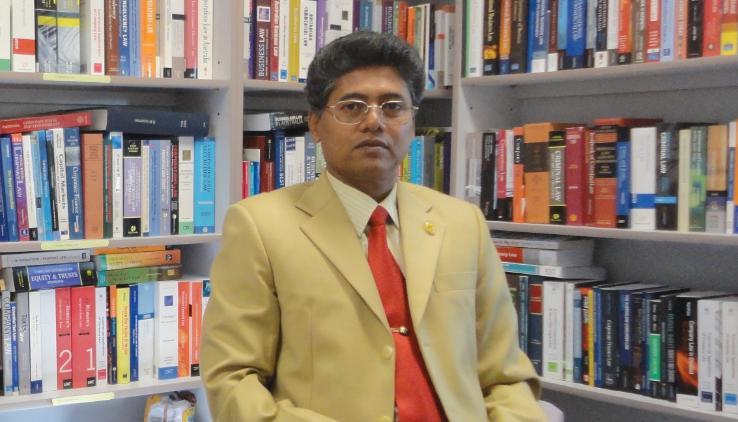
What led you to your career as an academic?
I have been in academia since 1990, soon after completing my LLB Hons and first LLM degrees in Bangladesh. Two major considerations led me to this career. First, an irresistible thirst for knowledge in the area of my study, and second, a feeling that this profession presents an ideal win-win situation for all parties involved in that the major functions of academics (reading, writing, teaching) entail creativity that enriches the attainments of the actors (employees as academics) themselves, enhances the reputation of the employer institutions and benefits the students as ultimate service recipients.
Most significant research accomplishments?
My publications and their impacts are considered to be my most significant research accomplishments. I have published so far 56 journal articles and three book chapters, and have presented 52 conference/seminar papers in different countries around the world, mostly in Australia, the United Kingdom, United States and Europe. As of 1 March 2021, my research outputs have been cited 709 times in the scholarly publications of 37 countries across the globe with an h-index 14 (based on a list of citations with auditable info on file). Apart from citations, my research outcomes have influenced legal reforms in Bangladesh in the area of securities and food safety regulation. For example, I was the first researcher who recommended a separate special tribunal for capital market lawsuits in Bangladesh. I formulated the composition and functions of the tribunal. The Parliament of Bangladesh has amended the legislation incorporating my recommendations and established such a special tribunal which has been notably successful in disposing of securities cases.
What do you consider to be your best paper/work and why? What did it change about the way people approach the field?
One of my articles ─S M Solaiman, ‘Legal Personality of Robots, Corporations, Idols and Chimpanzees: A Quest for Legitimacy’ (2017) 25(2) Artificial Intelligence and Law pp 155-79 ─ has sparked debate worldwide about the legal personality of robots. This article has been cited 226 times (as of 1 March 2021) in research pursuits of scholars including some of those from MIT, Harvard, Cambridge and Oxford universities. In this article, I uniquely analysed the justifications for conferring juristic personality on companies and idols and refusing to recognise such personality of chimpanzees and robots. Both sides of the debate surrounding robot’s legal personality are citing my article in developing their arguments.
Current research projects?
I am currently working on an interdisciplinary food safety project proposal, and also writing a paper on this topic for a highly regarded peer-reviewed journal.
I am also currently involved in a UOW Global Challenges funded project as a Co-Chief Investigator. The title of the project is ‘Smart Shoes: Motivating Older Adults to Walk Longer and Safer’. This is a multidisciplinary research project for which we have received $50,000. My role involves examining the health and safety requirements concerning the new device in Australia and overseas and suggesting ways of protecting intellectual property rights for our intended invention.
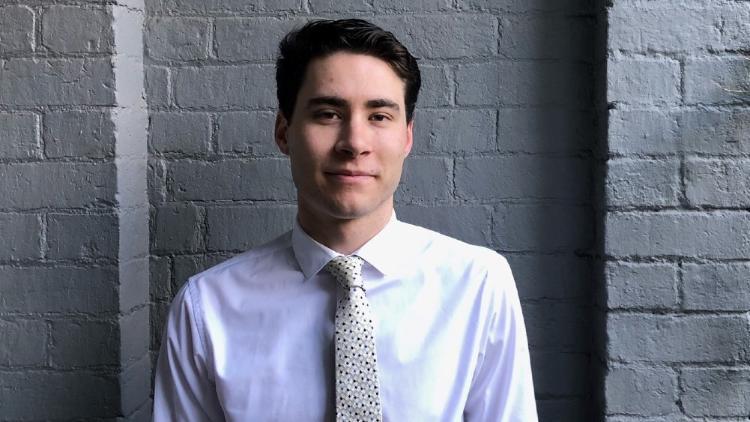
Bachelor of Laws (Hons I) / Bachelor of Commerce (Finance), with Distinction
Tell us about your studies
Studying a Bachelor of Laws and Bachelor of Commerce appealed to me because I believed that it would give me the skills to make a meaningful contribution to society. In particular, I was impressed by the UOW Law School’s focus on ensuring that their students graduated with both practical and theoretical skills that they could use moving forward in their career.
I completed my honours thesis on the intersection between equity and information privacy law, and the need to challenge the dominant conceptions of information privacy in the digital age. I think that a major obstacle in our modern lives is how we should regulate and protect individual privacy, particularly in the face of the widespread collection and aggregation of data by digital platforms and governments.
I completed my degree in December 2020, having gained an associateship with a Judge in the Federal Court of Australia. This was something I had hoped to achieve after finishing my degree, as it allows me to gain first-hand experience of the court processes and different forms of advocacy.
From the very beginning, I have thoroughly enjoyed the collaborative style of learning adopted in my classes. Each of my tutors taught me to think critically and encouraged me to challenge the status quo. A particular highlight of my degree has been completing my honours thesis. This allowed me to hone in on a particular area of law and work alongside a leading expert to debate ideas and present original research findings.
Student life at UOW
UOW was the perfect setting for me to undertake my studies, the beautiful and green campus, great coffee and a library open 24/7. UOW appealed to me because of its small close-knit classes with leading and approachable academics. I was also attracted to the student lifestyle embraced on campus and the ability to keep my community ties in Wollongong.
UOW provides a great learning experience, along with the opportunity to engage in a range of extra-curricular and social activities. Clubs and societies are an important part of student life, in my penultimate year I was Vice President of the University of Wollongong Law Students’ Society. I joined this society in the aim of contributing to the experience of law students, particularly in relation to educational and employment opportunities.
I was able to make a number of friends through the pod system in my law classes (where all subjects undertaken in the first semester are with the same group of students). This allowed me to build long lasting friendships that continued throughout my degree and outside university. I also made friends through the many events hosted by the University, both in in relation to law and university generally.
Support services & co-curricular opportunities
Throughout my degree I regularly had the opportunity to approach my lecturers and tutors and discuss any questions that I had. Although not a formal support service, the willingness of the law school academics to assist wherever possible demonstrated to me that they had genuine interest and commitment to their students learning and success. Additionally, I was given excellent advice from the careers service.
During my time at UOW I volunteered at the Illawarra Multi-cultural Centre as a youth refugee mentor. This allowed me to give back to the community and enhance my understanding of different cultures.
All of these activities brought balance and real world experience to the theoretical component of my degrees.
Scholarships & Internship opportunities
I received the Vice Chancellor’s Academic Excellence Scholarship and the Faculty of Law, Humanities and the Arts Undergraduate Scholarship. These scholarships allowed me to focus on my studies in my early years of my degree. Moreover, they allowed me to travel overseas throughout my breaks, which allowed me to gain insight into new cultures. In my view, this is as equally important as classroom learning.
I completed my legal internship as a clerk at Linklaters in London and at Allens in Sydney. During these clerkships I had the opportunity to attend client meetings, draft research notes and memorandums, and present and collaborate with likeminded students. I also had the opportunity to attend court hearings in both the High Court of Justice of England and Wales and the Supreme Court of New South Wales. These opportunities gave me a sense of what type of legal career I want to pursue and assisted me in obtaining my position as an Associate in the Federal Court of Australia.
At Linklaters and Allens I gained insight into the international nature of large-scale commercial deals, the problems which they present and strategic ways to resolve these problems. Furthermore, I learnt how to draft legal research memoranda, a very important skill when working for any firm or court.
In the third year of my degree, after receiving a law school award funded by Allens, I started work as a paralegal. In that role, I was primarily assigned to the Funds, Super and Wealth Practice Group. This involved working on an artificial intelligence project in partnership with a Regulation Technology (‘RegTech’) start-up company ‘Red Marker’. This involved interpreting and analysing legislative and regulatory provisions to develop ‘rules’ that engage in probabilistic risk analysis of marketing content produced by large companies in a range of sectors (e.g. banking and telecommunications).
I also had the opportunity to work as a research assistant to Professor Gregory Rose at the Institute for Transnational and Maritime Security at the University of Wollongong. I assisted with legal research to contribute to the writing of a book on transnational fisheries crimes for the World Wildlife Fund (WWF), and wrote research notes on terrorism financing laws, Middle Eastern conflict and the international law of the sea.
Furthermore, in my final year of university I commenced work as a part-time associate to the Honourable Justice MBJ Lee at the Federal Court of Australia. This position, in which I now work full-time, has armed me with a deep understanding of the litigation process and court room advocacy. It has also enhanced greatly my research and writing skills. The ability to partake in this role was enabled by the academics in the School of Law, who highlighted the importance of an associateship and recommended me for the position.
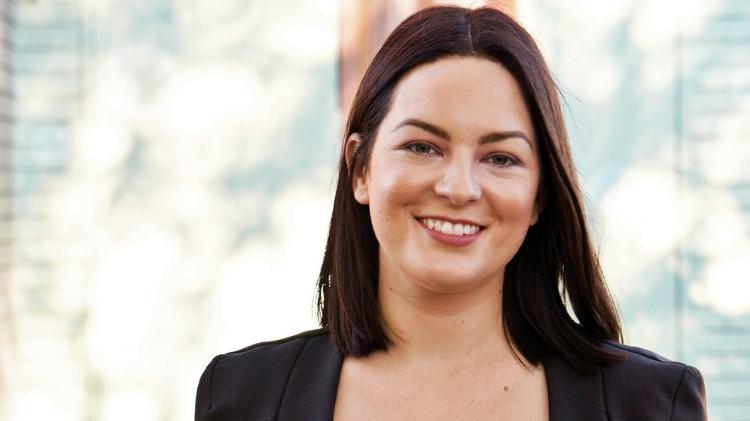
Founder and CEO at Her Lawyer
Degree: Bachelor of Laws, 2011
Courtney Bowie is the Founder and CEO of Her Lawyer, a virtual law firm for ambitious women in business.
Before starting Her Lawyer in 2017, Courtney worked as both a lawyer and consultant in top-tier law firms. Courtney is passionate about gender equality, mental health and wellbeing, especially in the legal profession.
In 2020, Courtney was awarded the Telstra Business Women’s Award - NSW Emerging Leader and Her Lawyer won 2 Stevie Awards in the ‘Start-up’ and ‘Innovation’ categories.
Courtney is also the Founder of Ladies Who Lawyer, an online community for women in law to support each other. For her work with ‘Ladies Who Lawyer’, Courtney was also awarded 2020 ‘Wellness Advocate of the Year’ in the Lawyers Weekly 30 Under 30 Awards.
UOW School of Law are delighted that Courtney has recently joined as a member of our School Advisory Committee.
Why did you chose to study at UOW?
When I was preparing to start university in 2008, UOW was the first university in NSW to be offering a standalone Bachelor of Laws. Having decided that I wanted to become a lawyer as soon as possible, it was a no-brainer for me to attend. The proximity to home, beautiful scenery on my drive down south and expansive grounds sealed the deal.
Was there an area of study that was important to you?
I loved that the UOW School of Law offered interesting subjects during the summer and winter semester breaks. This was an opportunity to learn from international and subject matter experts at a time when the university was very calm and quiet. It was the perfect atmosphere for deep learning. One of my favourite subjects was International and Comparative Indigenous Legal Issues, where we learnt about the different experiences and legal treatment of indigenous peoples in Australia and the US and Canada. This course lit the spark for my later work in indigenous communities, encouraging education and equality.
Did you conduct an internship during your degree? If so, where and how did it benefit you?
I volunteered as a student and later as a solicitor at the Illawarra Legal Centre. This was an interesting insight into the role that lawyers play in the community. The experience taught me invaluable skills in listening, empathy and problem solving, which I have employed throughout my career.
What skills and experience did you receive during your degree that helped once you entered the world of work?
I think some of the most important skills I learnt during my time at UOW were dispute resolution skills. In every job I've ever had – and in fact in every part of my life – I've needed to rely on those skills to move forward towards my goals.
What do you do for work now and what was the journey that got you there?
I am the founder and principal solicitor at Her Lawyer, a virtual law firm for ambitious women in business. The road I took to get here was an interesting one.
I started my first job in law in 2008 – in the first year of my degree. I was a good student, but I couldn't wait to graduate and become a real lawyer. I soon discovered that the law is not a very safe space for women, as lawyers or as clients. The boys club was very real.
But being able to give back to community is what kept me going.
And then in 2012, I woke up with a migraine I couldn't shake. I saw lots of doctors, did all the tests, but no one could tell me what was wrong. Until one day a neuropsychologist diagnosed with me severe anxiety and depression. I took a break from my career to get well and to learn more about the world. After I returned, I decided to become my own boss.
In March 2017, I officially opened Her Lawyer, a virtual law firm for ambitious women in business. We are passionate about making the law accessible, promoting mental health and wellness, and gender equality.
In 2019, I fell pregnant and became very ill. Working was very tough. And then I gave birth to my little boy.
And working was still very tough.
In 2020, I won the Telstra Business Women’s Award for NSW Emerging Leader and then the 30 Under 30 Wellness Advocate Award for my work as the founder of ‘Ladies Who Lawyer’, an online community for women in law to support each other. Her Lawyer won 2 Stevie Awards in start-up and innovation categories. The firm continues to go from strength to strength leading the way in innovation, gender equality, mental health advocacy and supporting more ambitious women in business than ever before.
Did you always know where you wanted your degree to take you?
I recall in one of my first introductory classes at UOW a discussion about how students want to become lawyers for one of two reasons: because they want to make a lot of money or because they want to save the world. I honestly didn’t know then which category I fell into. I've since figured out that you needn’t tie yourself to that narrative: with a career in law you can make a living and make a difference, and that's what I am aiming to do.
What advice would you give to students who are aiming for a career path similar to yours?
Don't be afraid to think differently. The law is such an old school profession, and the rate of change is glacial. It can be incredibly frustrating and that's why so many people drop out in the first few years. I would encourage students to look to the future and recognise the importance of dreaming. Just because your peers and supervisors can't see a different future or a new possibility, doesn't mean it's impossible. When I told my friends, family and colleagues I was going to start a virtual law firm for women, work remotely from my laptop and get clients through social media, almost every single person told me I was crazy. But here I am 4 years later – my business has carried me through 2 severe illnesses, the birth of my son and a pandemic. And that's just what it's done for me! Her Lawyer has also helped hundreds of women to start and grow beautiful businesses that make a real difference in their lives and the lives of others. If I had listened to the doubters and naysayers 4 years ago, I would never have been able to have the impact I've had. Make your own path.
Is there anything you would like to say on UOW School of Law’s 30th Anniversary?
I look forward to the next 30 years of UOW and continuing to see the amazing talent that the university nurtures, and the impact they are making on the world.
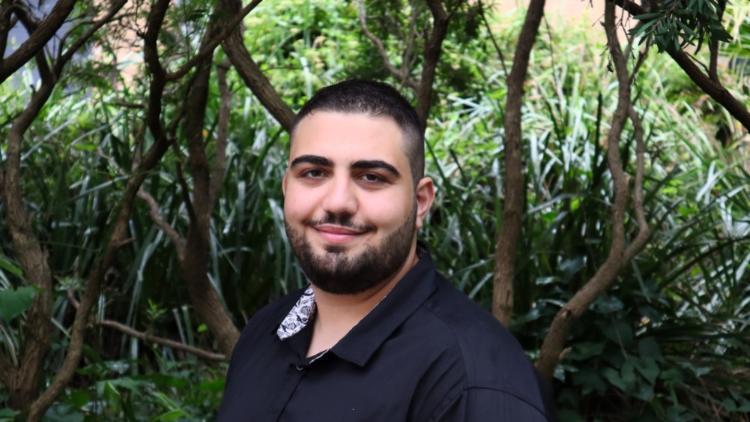
Degree: Bachelor of Business – Bachelor of Laws
The law has intrigued Mahmoud since he was a child. With his passion for public speaking, advocacy and social justice Mahmoud knew the legal profession as the career path for him. When asked about the driving force behind his decision to study law, Mahmoud said, “I have always viewed the law as the framework for a functioning society and I was always interested in understanding those mechanisms that operate it.”
Mahmoud was drawn to UOW’s South Western Sydney campus in Liverpool “due to the facility’s modern approach to education and teaching.” When asked of his favourite part of his campus experience Mahmoud said, “definitely the students, staff and the environment we are in! Being on a smaller campus, you become acquainted with so many individuals, each on a different walk of life”.
What have you enjoyed most about your studies so far?
The most enjoyable part of my degree so far has to be the practical components. With an aptitude for problem-solving, I thoroughly enjoy group discussions that involve critical analysis and constructing creative and unique arguments. It is highly beneficial to be open to multiple perspectives on a particular issue whilst debating a topic.
What do you hope to do and achieve with your degree?
My current career prospects are to graduate with honours and to be admitted to the Law Society of New South Wales as a practicing solicitor. I hope to make a contribution to organisations and society by assisting with the administration of justice. In the future, I would like to contribute to the growth of legal education, so I would hope to eventually return to academia. I am fascinated by furthering legal research and educating the next generation of legal minds.
How have you found the student life at UOW? How did you go about making friends?
I think UOW allows for a balanced lifestyle between study, work, extra-curricular and recreational activities. So many opportunities can be accessed both internally and externally. In my first year, I joined the Law Students Society Committee, elected as the first-year representative at SWS. I was then re-elected as the second-year representative and now as the Vice President of Marketing. It was important for me to get involved in this society to ensure our cohorts’ interests at SWS were adequately represented and to develop the rapport between students.
The university has also provided me the opportunity with what I think is one of the best jobs. Being a student representative, I get to help prospective students discover their passions and get them one step closer to achieving their aspirations. Both my student representative and LSS positions contribute to my UOWx record which recognises and highlights my involvement and skills developed beyond education.
Meeting people and making friends was not a priority of mine when coming to university. However, that changed quickly when I was thrown into a POD group where I have met some life-long friends. Student life became lively once I had formed a great group of friends, both for academic support and socialising. The best way to make friends is to take any opportunity that comes your way, you never know what could come out of it!
These experiences have exposed me to a variety of people from different backgrounds and disciplines, each with unique career prospects and goals. They have developed my interpersonal skills significantly and have contributed to keeping me organised. They have also made me receptive to various individuals’ perspectives, which I can then draw on and apply in my studies.
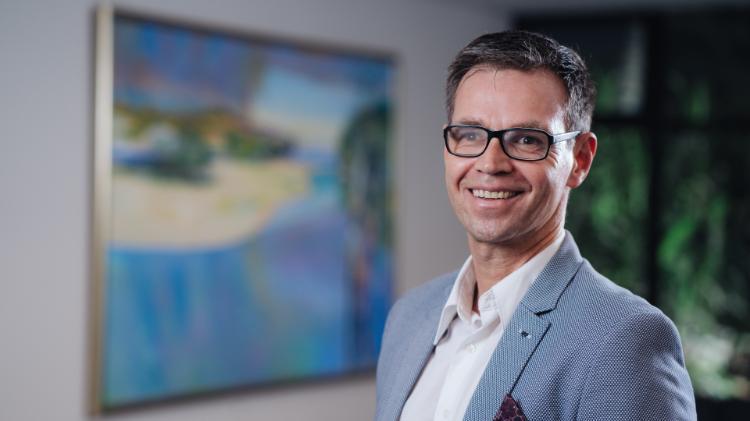
Markus joined the School of Law 2 years ago to teach Constitutional law, international trade law and international investment law. Markus has studied Law globally, including Germany, Canada and The United State of America.
What is the most rewarding part of your job?
The intellectual exchange with students and other academics and learning from and with both groups.
What is your teaching philosophy?
Treating students as equals who I want to challenge the ideas that they are exposed to – including my own.
How do you motivate students?
I try to relate that the questions we are addressing in class are not merely academic by showing the real-world relevance of the materials I present in class.
Why did you choose to study your degree?
I originally wanted to become a diplomat and law was a pathway towards that goal. I very quickly focused on international law subjects which have continued to fascinate me since that time.
What led you to your career as an academic?
I enjoy the intellectual freedom and the ability to study a subject in great depth on the one hand as well as the interaction with curious minds in the classroom.
Is there an area of Law that is important to you? Why?
International and Comparative Law. The broader questions of how we want to live together not just in Australia but in a more global context fascinate me. Think about climate change, our relationship with China or how to think about autonomous weapon systems. Sadly, things have become far too interesting in the last 10 years or so and in some ways I would like for them to become more “boring” as that would indicate a higher degree of stability in the international system.
Are you currently working on any research papers?
Far too many! I have several papers on international trade dispute settlement, the latest one is creating a new framework for understanding the degree to which international economic agreements are integrative or not. I am using recent agreements for my sample.
What do you think are your most significant research accomplishments?
The first is understanding the ways of how to translate scientific uncertainty into legal decisions. The second to better explain the challenges of how to translate the law of armed conflict into computer code.
What do you consider to be your best paper/work and why?
What did it change about the way people approach the field?
It’s a bit of a toss up between Law Talk v. Science Talk: The Languages of Law and Science in WTO Proceedings and The Dehumanization of International Humanitarian Law: Legal, Ethical and Political Implications of Autonomous Weapon Systems. The first broke new ground on how to deal with scientific uncertainty and legal decisions as the two disciplines have fundamentally different ways of how they operate. The second was the first in-depth exposition of how to think about not only the legal but also the closely related political and ethical questions surrounding autonomous weapon systems.
Did you conduct an internship during your degree? If so, where and how did it benefit you?
I had to – German legal education requires a range of internships at courts, administrative agencies and in private practice. I also clerked for the then-President of the Supreme Court of Israel, Aharon Barak. It opened my eyes for a range of problems I hadn’t considered before and how the decisions that this court in particular takes had immediate relevancy. But it also showed how fragile such decisions can be when they are not carried out by governments at later stages.
Lastly, what advice would you give to students who are studying Law & are considering a research career?
To be curious about things that seem odd – and most importantly to ask the question why a legal rule says what it says or why a court has decided what it did.
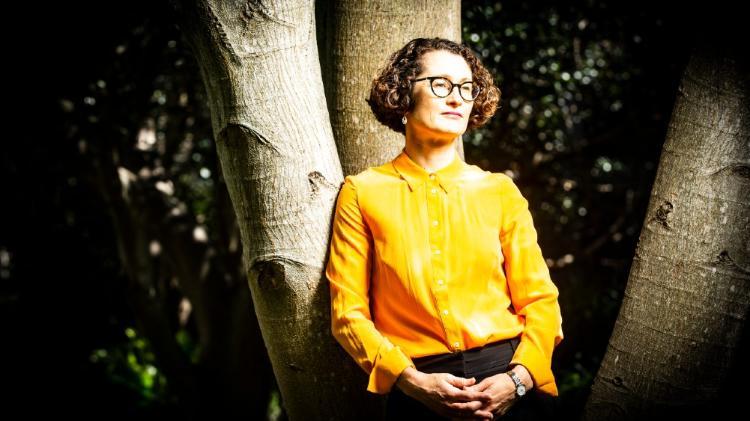
Dr Quilter’s career journey
Dr Quilter joined the UOW School of Law in 2010, after a decade practising criminal and constitutional law at the NSW Crown Solicitor’s Office and the Office of the NSW Solicitor General and Crown Advocate. She appeared in a number of significant constitutional and criminal law matters in the NSW Supreme Court, Court of Criminal Appeal, Court of Appeal and the High Court of Australia. The transition from practice to academia was aided by a strong research background: after graduating with both the University Medal for Arts (Sydney University) and Law (UNSW), in 2000 Dr Quilter completed a PhD at Monash University under the supervision of Professor Terry Threadgold. In addition to completing a doctoral thesis on ‘Re-inventing rape: an analysis of legal, medical, feminist and governmental discourses’, Dr Quilter benefited from the opportunity to spend time at the University of California, Berkeley, studying under Professors Judith Butler and Avital Ronnell, which in turn led to a year as a Visiting Scholar at New York University and Columbia University. The vibrant scholarship of Drucilla Cornell, Avital Ronnell, Kendall Thomas and Jacques Derrida peaked her interest in issues of gender, race and social justice issues and her commitment to one day pursuing a career in research. However, Dr Quilter, felt that first it was important to practise law before teaching and researching as an academic. After 10 years in practise family changes meant a move to the Illawarra and it was then that Dr Quilter returned to academia.
Current research highlights
Dr Quilter researchers across a range of criminal law and justice topics including sexual violence, homicide, bail, fines, homelessness and public space regulation.
Informed by her previous PhD research on rape laws, and building on a recently completed study of the concept of ‘intoxication’ in Australian criminal laws (funded by an Australian Institute of Criminology - Criminology Research Grant), Dr Quilter is currently leading a major study of intoxication evidence in rape trials in Australia. A significant proportion of sexual assaults are associated with alcohol and other drug use, and many jurisdictions have introduced legislative provisions to break the assumed nexus between intoxication and consent – an assumption that has seriously impeded the delivery of justice to sexual assault victims. The project involves a systematic analysis of how evidence of complainant intoxication and/or defendant intoxication impacts upon key trial decisions made, and strategies employed, by prosecutors, defence lawyers and judges.
The project is a collaboration with Luke McNamara (UNSW), and is funded by an Australian Research Council Discovery Project grant.
Most significant research accomplishments
Dr Quilter is widely known as the Australian expert on alcohol-related one-punch violence. Following the tragic deaths of Thomas Kelly (2012) and Daniel Christie (2013) in Sydney’s King Cross, Dr Quilter embarked on a major study of how Australian law-makers responded to concerns about alcohol-related violence, including the introduction of a new homicide offence (Assault Causing Death), the operation of these laws and other regulatory responses such as ‘Lock Out Laws’. The quality of Dr Quilter’s research in this area has been recognised by the Australian and New Zealand Society of Criminology. For her article ‘Populism and criminal justice policy: An Australian case study of non-punitive responses to alcohol-related violence’ Dr Quilter was awarded the Allen Austin Bartholomew Award for best article published in the ANZ Journal of Criminology. Another of her articles, ‘One Punch Laws, Mandatory Minimums and “Alcohol-Fuelled” as an Aggravating Factor: Implications for NSW Criminal Law’, published in the International Journal for Crime, Justice and Social Democracy, has been the most downloaded article in the journal’s history.
In addition to contributing to the scholarly literature, Dr Quilter is committed to knowledge-transfer beyond the academy and pursuing impact on criminal justice policy and law reform. She regularly communicates her research findings to wider audiences, through submissions and testimony to government inquiries (such as the NSW Law Reform Commission’s recent report on Consent in Relation to Sexual Offences (2020)), and by engaging with the media. She is a regular contributor to The Conversation and has written opinion pieces for the Sydney Morning Herald. She has provided expert commentary for more than 100 stories in national and international media outlets including ABC TV’s 7.30, ABC Radio National’s Law Report, The Saturday Paper; The Australian, RTE Radio, Ireland, and The Telegraph (UK).
Leading change in the operation of the criminal justice system
Dr Quilter is proud of her alcohol-related violence research which highlighted the importance of empirical research on the operation of existing and new laws as important foundations for supporting criticism of how and why legislators turn to criminal law ‘solutions’.
Another feature of Dr Quilter’s research is a determination to investigate ‘hidden’ punitive aspects of the criminal justice system’s operation that don’t often attract the attention of researchers or the media. A good example is her work with Russell Hogg (QUT) on the most common form of penalty imposed in our criminal justice system: the fine. Despite the paucity of academic scholarship in the area, this research has demonstrated the consequential effects of the fines system particularly on disadvantaged persons. Their recent study of the policing of mandatory bicycle helmet laws in NSW revealed that what was once a sound road safety measure – the requirement that all cyclists wear helmets – has evolved into a highly discretionary policing tool with seriously punitive effects for some of the most disadvantaged communities in the state. This research has benefited greatly from working closely with a variety of legal and government agencies including Legal Aid NSW, the NSW Legal Assistance Forum (NLAF), the Aboriginal Legal Service (NSW/ACT) and Just Reinvest NSW, and has provided a strong foundation for calls for a fairer system of fines enforcement.
Funding success
Dr Quilter has enjoyed significant success in attracting Australian Research Council funding to support her collaborative research with leading Australian criminal and criminalisation researchers. These include a Linkage Project grant for a collaborative national study of the relationship between homelessness and criminalisation, in partnership with researchers at the UQ, UNSW and UTS and 10 Australian community legal centres; an ongoing Discovery Project grant that charts the ‘changing face’ of Australian criminal laws directed at violence, risk and safety, in collaboration with Luke McNamara and David Drown (UNSW), Arlie Loughnan (University of Sydney), Russell Hogg (QUT) and Lindsay Farmer (University of Glasgow); and the above-mentioned Discovery Project on rape trials and intoxication evidence.
School of Law's 30 years of excellence - where to next?
On Thursday 25th February our Dean, Professor Trish Mundy was joined by students, industry partners, alumni & staff as she honoured the past 30 years of Law at UOW and anticipates the next chapter. As part of this special event the School of Law also officially launched UOW's Bachelor of Laws (Graduate Entry) program at Sydney CBD Campus.
Read more about the event Download Dean of Law address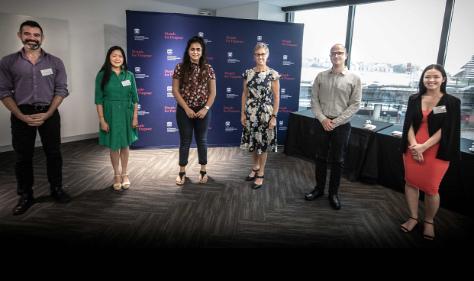
30th anniversary events
The School of Law will celebrate the 30th anniversary with special events and lectures showcasing UOW Law history and the path for the future. We were excited to welcome back The Honourable Michael Kirby AC CMG to the UOW School of Law. As part of our 30th Anniversary celebrations, Mr Kirby will joined us on Monday, 12 April for two student events.
Stories: 30 years of UOW Law
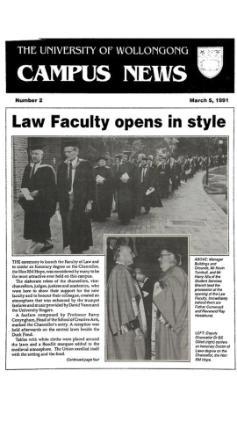 Law Faculty opens in style
Law Faculty opens in style
Campus News 5 March 1991
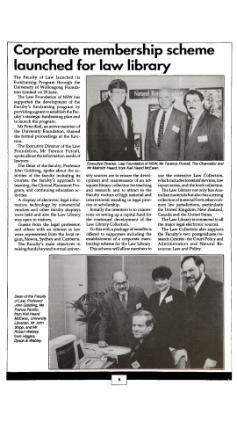 Corporate Membership Scheme launched for Law Library
Corporate Membership Scheme launched for Law Library
Campus News 7 July 1993
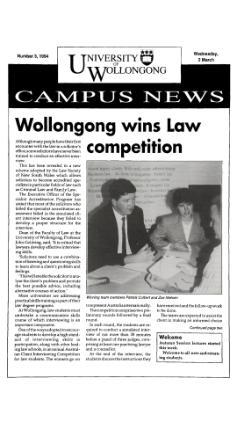 Wollongong wins Law competition
Wollongong wins Law competition
Campus News 2 March 1994
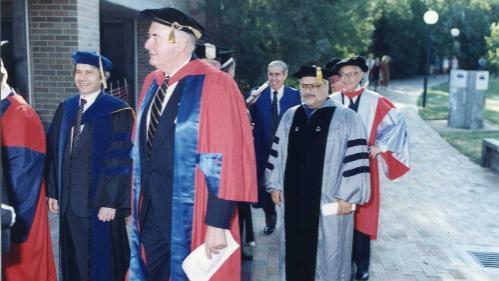
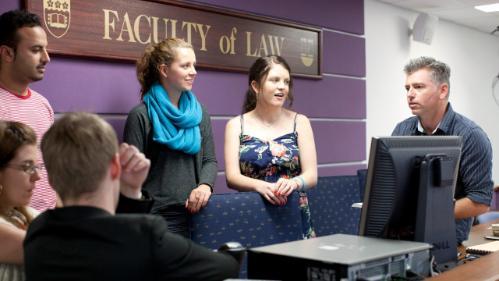
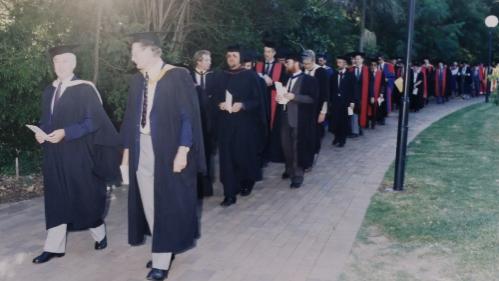
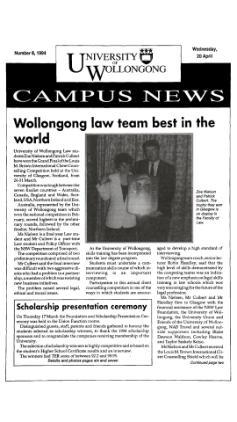 Wollongong Law team best in the world
Wollongong Law team best in the world
Campus News 20 April 1994
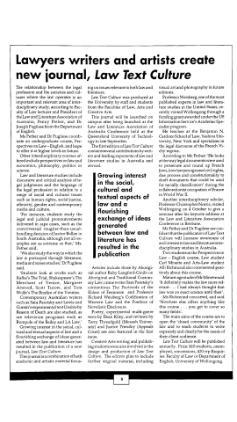 Law Text Culture launched
Law Text Culture launched
Campus News 26 October 1994




